Order East Timor and Indonesia Books from ETAN (original) (raw)
Books & Pamphlets
Books on Indonesia, West Papua, and Aceh
Periodicals, Magazines and Pamphlets
Buttons, Bumperstickers, T-shirts, etc
Questions or have a resource we should be selling:write us
ETAN Needs Your SUPPORT Contribute Today!
T-shirts, sweatshirts, long-sleeved shirts, mugs, water bottles, kid clothes, bags, notebooks, kids clothes and more. Two designs!
---
[ 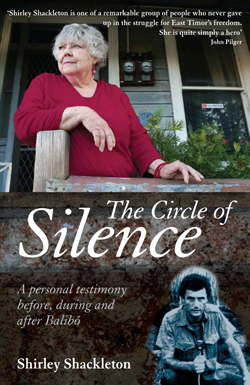 ](#B91%5Fshirley sh)
](#B91%5Fshirley sh)
T-shirts, sweatshirts, long-sleeved shirts, mugs, water bottles, kid clothes, bags, notebooks, kids clothes and more. Two designs!
[ 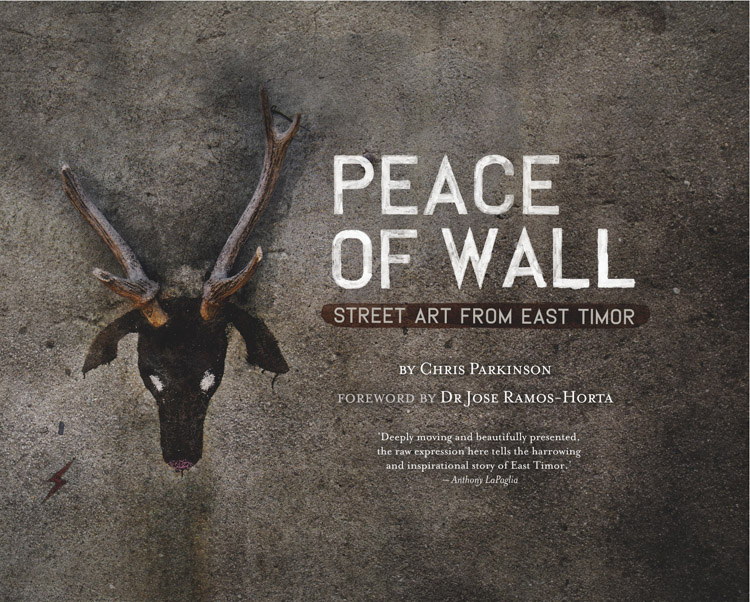 ](#B92 oeace of wall)
](#B92 oeace of wall)
[  ](#B91%5Fshirley sh)
](#B91%5Fshirley sh)
Books -Books and pamphlets listed alphabetically by author
 |
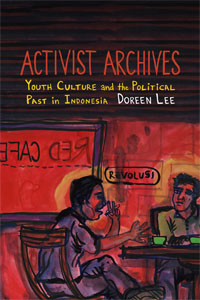 |
 |
[  ](#B92 oeace of wall) ](#B92 oeace of wall) |
 |
 |
 |
|---|
 B123 Crossing the Line: Australia�s Secret History in the Timor Sea by Kim McGrath
B123 Crossing the Line: Australia�s Secret History in the Timor Sea by Kim McGrath
For fifty years, Australia has schemed to deny East Timor billions of dollars of oil and gas wealth. With explosive new research and access to never-before- seen documents, Kim McGrath tells the story of Australia�s secret agenda in the Timor Sea, exposing the ruthlessness of successive governments. Australia did nothing to stop Indonesia�s devastating occupation of East Timor, when � on our doorstep � up to 200,000 lives were lost from a population of 650,000. Instead, our government colluded with Indonesia to secure more favourable maritime boundaries. Even today, Australia claims resources that, by international law, should belong to its neighbour � a young country still recovering from catastrophe and in desperate need of income. Crossing the Line is a long-overdue expos� of the most shameful episode in recent Australian history.
Kim McGrath has been published in the Monthly and has long experience working in government and policy development. She is Research Director at the Bracks Timor-Leste Governance Project, which provides policy advice to the Timor-Leste government.
"Crossing the Line is an unassailable expos� of Australia�s ruthless pursuit of resources in the Timor Sea. A timely and definitive book." �Jos� Ramos-Horta
"Tigerishly researched, this book exposes the economic interests underpinning Australia's diplomacy towards East Timor." �Professor Clinton Fernandes, University of NSW
Laying bare the greed for petroleum resources that has steered five decades of Australian policy regarding East Timor, Kim McGrath�s Crossing the Line is a masterfully written and researched piece of scholarship.... [F]or anyone interested in understanding exactly how Australian greed has shaped its policy towards East Timor, Crossing the Line makes for indispensable reading �
Michael Rose,The Interpreter
Black Inc., 2017, 216 pp. $20
Listen:Kim McGrath and Phillip Adams discuss Crossing the Line on ABC Radion National's Late Night Live, August 30 2017Reviews of Crossing the Line: Australia�s Secret History in the Timor Sea:
Review: Shameful lust for riches under the Timor Sea, by Michael Rose, The Interpreter Review: Crossing the Line: Australia's Secret History in Timor Sea, The Australian
Are we the bad guys? Australia�s ruthless past with East Timor, Crikey Australia's agreement with Timor Leste does not have a positive history, Paul Malone**,** Sydney Morning Herald
How Australia crossed a line in the Timor Sea, Kim McGrath**,** The Interpreter
B121 The History of Timor-Lesteby Frederic Durand  The Democratic Republic of Timor-Leste, a former Portuguese colony occupied by Indonesia from 1975 to 1999, became in 2002 the first new sovereign state of the twenty-first century. Its modern nationhood belies its ancient history. Archaeological data found on the island can be traced back at least 42,000 years, beyond most ancient European artifacts. The book provides an engaging overview of the history of the country from the earliest legends and first traces of human habitation through the defining events that led to independence.
The Democratic Republic of Timor-Leste, a former Portuguese colony occupied by Indonesia from 1975 to 1999, became in 2002 the first new sovereign state of the twenty-first century. Its modern nationhood belies its ancient history. Archaeological data found on the island can be traced back at least 42,000 years, beyond most ancient European artifacts. The book provides an engaging overview of the history of the country from the earliest legends and first traces of human habitation through the defining events that led to independence.
The text is richly illustrated with over two hundred maps, engravings, and photographs. A detailed historical time line follows the text.
FR�D�RIC B. DURAND is a professor at the University of Toulouse II-Jean Jaur�s. He has published more than twenty books on the region, including East Timor, a Country at the Crossroads of Asia and the Pacific: A Geo-Historical Atlas.
Silkworm Books, 2017, 194 pp., 150 illustrations, 1 figure, 43 maps 25region,includingEastTimor,aCountryattheCrossroadsofAsiaandthePacific:AGeo−HistoricalAtlas.SilkwormBooks,2017,25 region, including East Timor, a Country at the Crossroads of Asia and the Pacific: A Geo-Historical Atlas.Silkworm Books, 2017, 25region,includingEastTimor,aCountryattheCrossroadsofAsiaandthePacific:AGeo−HistoricalAtlas.SilkwormBooks,2017,25
"On behalf of the Timorese people, I wish to express my great appreciation and admiration to Professor Durand for this important contribution to our historical record." -Mgr. Carlos Filipe Ximenes Belo, Nobel Peace Prize laureate
see also Timor-Leste: A New State with Century-old Roots in World History/Timor-Leste: un nouvel Etat enracin� depuis des si�cles dans l'histoire mondiale/Um novo Estado com raizes seculares na historia mundial by Frederic Durand
B124 Bonded Through Tragedy, United in Hope: The Catholic Church and East Timor's Struggle for Independence: A Memoir
by Hilton Deakin with Therese & Jim D�Orsa
 Some people step up to unexpected challenges and grow in stature. Bonded through Tragedy, United in Hope is a beautifully written memoir about Hilton Deakin, the �boy from the bush� who did just that. Hilton Deakin is a Catholic bishop and a key figure in East Timor�s struggle for self-determination, who became a confidante to independence fighters and those in solidarity with them. At a time when most Australians had little knowledge of, or sympathy for the plight of the East Timorese under Indonesian occupation, Deakin became a voice for the voiceless. Not just a personal story, this is a story of one country�s struggle for independence � where compassion, courage and commitment won out. Hilton Deakin�s journey into justice shows us that we too can shine a light in dark places.
Some people step up to unexpected challenges and grow in stature. Bonded through Tragedy, United in Hope is a beautifully written memoir about Hilton Deakin, the �boy from the bush� who did just that. Hilton Deakin is a Catholic bishop and a key figure in East Timor�s struggle for self-determination, who became a confidante to independence fighters and those in solidarity with them. At a time when most Australians had little knowledge of, or sympathy for the plight of the East Timorese under Indonesian occupation, Deakin became a voice for the voiceless. Not just a personal story, this is a story of one country�s struggle for independence � where compassion, courage and commitment won out. Hilton Deakin�s journey into justice shows us that we too can shine a light in dark places.
�A ripping yarn of how one solitary Australian bishop stood in solidarity through oppression and liberation, with downtrodden people who rose up and established the newest nation in our region. This larger-than-life voice has witnessed much human misery and triumph and in the process found a whole new life in the politics and advocacy of human rights, mixing with people he would never have met in the Church.� - Fr Brennan SJ, Professor of Law, Australian Catholic University
Publishers: 2017 328 pp.$40
Bishop Vincent Long launches Bonded through Tragedy, United in Hope; the Catholic Church & East Timor�s Struggle for Independence. A Memoir, Social Policy Connections
Book launch: Bonded through tragedy, united in hope,Melbourne Catholic
 B118 The Hammer Blow: How 10 Women Disarmed a War Plane
by Andrea Needham
B118 The Hammer Blow: How 10 Women Disarmed a War Plane
by Andrea Needham
The Hammer Blow is Andrea Needham�s firsthand account of her part in the Seeds of Hope East Timor Ploughshares action. On 29 January 1996, Andrea, Jo Blackman and Lotta Kronlid broke into a British Aerospace factory in Lancashire and used household hammers to disarm a Hawk warplane bound for Indonesia.The plane would have been used to continue Indonesia�s campaign of genocide against the people of occupied East Timor, and the aim of the action was to stop the plane being delivered.
They were arrested, charged with �2.4m of criminal damage, and sent to prison to await trial. A week later, Angie Zelter joined them, accused of conspiracy. After six months in prison, all four were acquitted by a Liverpool jury in a court case that effectively put Britain�s arms trade on trial.
The disarmament could not have happened without the support of the other six members of the Seeds of Hope Ploughshares group � Lyn Bliss, Clare Fearnley, Emily Johns, Jen Parker, Ricarda Steinbrecher and Rowan Tilly � who were absolutely integral to the whole action from the very start. �The Hammer Blow � how 10 women disarmed a warplane�, was published by Peace News on 29 January 2016, the 20th anniversary of the action.
 �Seeds of Hope was a wonderful act of solidarity with the people of East Timor threatened by British weapons. The support of people around the world throughout our long struggle for independence was crucial, and this action raised the profile of Britain�s role in arming Indonesia, and raised the spirits of the Timorese people. The Hammer Blow gives a fascinating inside account of the whole story, and should be read by anyone concerned about solidarity and justice.� � Bella Galhos, Timorese human rights activist
�Seeds of Hope was a wonderful act of solidarity with the people of East Timor threatened by British weapons. The support of people around the world throughout our long struggle for independence was crucial, and this action raised the profile of Britain�s role in arming Indonesia, and raised the spirits of the Timorese people. The Hammer Blow gives a fascinating inside account of the whole story, and should be read by anyone concerned about solidarity and justice.� � Bella Galhos, Timorese human rights activist
The �Liverpool Four� were part of Timor-Leste�s network of friends around the world who with courage and imagination contributed significantly in raising awareness about British arms sales to Indonesia. The book illustrates how nonviolent actions by citizens may deter, discourage and prevent greater violence against innocent peoples. I remain till this very day in admiration and gratitude for the �Liverpool Four�.� � Jose Ramos Horta, President of Timor-Leste (2007-2012) Nobel Peace Prize Laureate (1996)
The Hawk Ploughshares Trial was one of the most remarkable instances of a jury accepting the defence of preventing a greater crime... This is not just a thoroughly readable book but is, more importantly, an inspiration. � Paul Rogers, Professor of Peace Studies, University of Bradford
Peace New Press, 2016, 310 pp. illustrated
$21 Blog for book;Facebook page
B119 Activist Archives: Youth Culture and the Political Past in Indonesia by Doreen Lee
 In Activist Archives Doreen Lee tells the origins, experiences, and legacy of the radical Indonesian student movement that helped end the thirty-two-year dictatorship in May 1998. Lee situates the revolt as the most recent manifestation of student activists claiming a political and historical inheritance passed down by earlier generations of politicized youth. Combining historical and ethnographic analysis of "Generation 98," Lee offers rich depictions of the generational structures, nationalist sentiments, and organizational and private spaces that bound these activists together. She examines the ways the movement shaped new and youthful ways of looking, seeing, and being�found in archival documents from the 1980s and 1990s; the connections between politics and place; narratives of state violence; activists' experimental lifestyles; and the uneven development of democratic politics on and off the street. Lee illuminates how the interaction between official history, collective memory, and performance came to define youth citizenship and resistance in Indonesia�s transition to the post-Suharto present.
In Activist Archives Doreen Lee tells the origins, experiences, and legacy of the radical Indonesian student movement that helped end the thirty-two-year dictatorship in May 1998. Lee situates the revolt as the most recent manifestation of student activists claiming a political and historical inheritance passed down by earlier generations of politicized youth. Combining historical and ethnographic analysis of "Generation 98," Lee offers rich depictions of the generational structures, nationalist sentiments, and organizational and private spaces that bound these activists together. She examines the ways the movement shaped new and youthful ways of looking, seeing, and being�found in archival documents from the 1980s and 1990s; the connections between politics and place; narratives of state violence; activists' experimental lifestyles; and the uneven development of democratic politics on and off the street. Lee illuminates how the interaction between official history, collective memory, and performance came to define youth citizenship and resistance in Indonesia�s transition to the post-Suharto present.
Elegantly written, rich with ethnographic and archival material, and bursting with theoretical insights, Activist Archives offers novel analysis of one of the most important subjects of contemporary Indonesia. In Doreen Lee's sensitive ethnography the student activist emerges expressing a mix of fiery passion, intellectual idealism, irreverent playfulness, hipster self-consciousness, nostalgia, rivalry, and disillusionment. --; Karen Strassler, author of, Refracted Visions: Popular Photography and National Modernity in Java
Duke University Press, 2016, 296 pp.
$25
B120 Activism and Aid : Young Citizens� Experiences of Development and Democracy in East Timor By Ann Wigglesworth
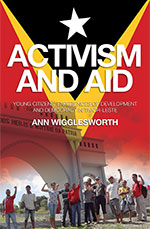 Timor-Leste�s independence was forged at a time international developmental theory had rejected top down approaches and recognised the importance of participatory approaches informing developmental strategies. When the arrival of the United Nations and a multitude of bilateral and multilateral and non-government organisations arrived in Timor-Leste in 1999, it was hoped that the international intervention would at last produce a development success story.
Timor-Leste�s independence was forged at a time international developmental theory had rejected top down approaches and recognised the importance of participatory approaches informing developmental strategies. When the arrival of the United Nations and a multitude of bilateral and multilateral and non-government organisations arrived in Timor-Leste in 1999, it was hoped that the international intervention would at last produce a development success story.
Independence also brought the realization that dreams for an independent Timor-Leste varied, often according to their generation. Three generations of Timorese: the political elite, a younger generation of independence activists (gerasaun foun) and today�s youth of independent Timor-Leste, each bring their own experiences and face different challenges in Timor-Leste. Today stark contrasts between the values of customary life and those of the modernising world place both community leaders and young Timorese at a crossroads. The experiences of the Timorese are unique, but this book reflects a broader analysis about how aid influenced processes of development can work in greater harmony with the people to realise their own visions of the future of the nation.
"An immensely readable and insightful glimpse into the experiences, concerns and aspirations of Timor-Leste's youth, charting their course from student activists to nation builders, from the fight for national liberation to the battle for participation in governance structures and aid and development programs. I strongly recommend this book to anyone wanting a snapshot of the principal challenges facing Timor-Leste today in its quest to build a strong, stable and equitable nation � for all citizens, young and old�. -Kirsty Sword Gusm�o Chair, Alola Foundation & Goodwill Ambassador for Education of the Democratic Republic of Timor-Leste
Monash University Publishing, 2016, 146 pp.
$40
B117 The Land of Gold: Post-Conflict Recovery and Cultural Revival in Independent Timor-Leste
by Judith M. Bovensiepen
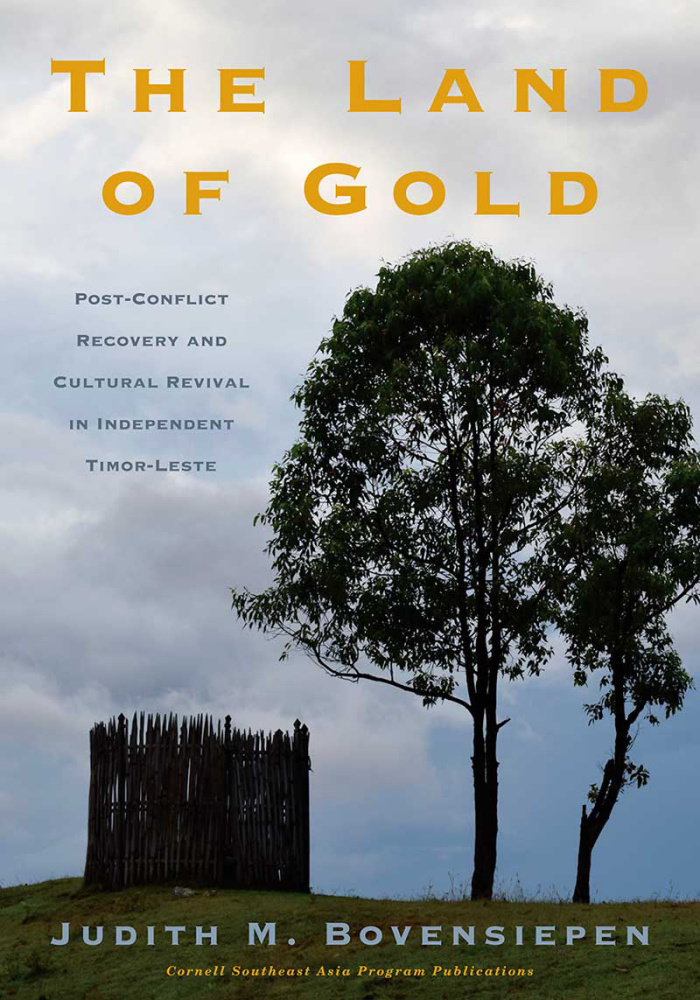
In the village of Funar, located in the central highlands of Timor-Leste, the disturbing events of the twenty-four-year-long Indonesian occupation are rarely articulated in narratives of suffering. Instead, the highlanders emphasize the significance of their return to the sacred land of the ancestors, a place where "gold" is abundant and life is thought to originate. On one hand, this collective amnesia is due to villagers' exclusion from contemporary nation-building processes, which bestow recognition only on those who actively participated in the resistance struggle against Indonesia. On the other hand, the cultural revival and the privileging of the ancestral landscape and traditions over narratives of suffering derive from a particular understanding of how human subjects are constituted. Before life and after death, humans and the land are composed of the same substance; only during life are they separated. To recover from the forced dislocation the highlanders experienced under the Indonesian occupation, they thus seek to reestablish a mythical, primordial unity with the land by reinvigorating ancestral practices. The Land of Gold explores the significance of people�s affective and ritual engagement with the environment and with their ancestors as survivors come to terms with the disruptive events of the past.
Cornell University Press, 2015, 216 pp**.,** illustrated.
$24
"The Land of Gold is an ethnography of postconflict life in East Timor that is at once lyrical and devastating. By tracing how diverse relationships to the land�loss, reclamation, and reimagination�shape and are shaped by survivors, Judith Bovensiepen offers a new understanding of the long years of war that captures both the personal and the political."�Tyrell Haberkorm, ANU College of Asia and the Pacific
 B110 The Politics of Timor-Leste: Democratic Consolidation after Intervention
Edited by Michael Leach, Damien Kingsbury
B110 The Politics of Timor-Leste: Democratic Consolidation after Intervention
Edited by Michael Leach, Damien Kingsbury
The Politics of Timor-Leste explores the critical issues facing the nation as it seeks to consolidate a democracy following years of international intervention. The authors study the challenges that have burdened the state since it broke from Indonesia amid the violence of 1999 and formally achieved full independence in 2002. They assess the notable accomplishments of Timor-Leste�s leaders and citizens, and consider the country�s future prospects as international organizations prepare to depart. A close study of Timor-Leste sheds light on ambitious state-building projects that have been initiated, with varying success, across the globe.
Cornell University Press, 2013, 277 pp. $24
 B105 Beloved Land: Stories, Struggles and Secrets from Timor-Leste
by Gordon Peake
B105 Beloved Land: Stories, Struggles and Secrets from Timor-Leste
by Gordon Peake
Blending narrative history, travelogue, and personal reminiscences based on four years of living in the country, Gordon Peake shows the daunting hurdles that the people of Timor-Leste must overcome to build a nation from scratch, and how much the international community has to learn if it is to help rather than hinder the process. Family politics, squabbles, power struggles, old romances, and even older grudges are woven into life in this land of intrigue and rumours in the most remarkable ways.
Above all, Beloved Land is a story about the one million East Timorese who speak nearly 20 different languages, and who are exuberantly building their nation. Written with verve and deep affection, the book introduces a set of colourful Timorese and international characters, and brings them to life unforgettably.
Beloved Land shows that the story of Timor-Leste as much more than the narrow litany of conflict and violence often presented in the media. Increasingly, it is becoming a story about the exploitation of oil and gas, and whether Timorese leaders can steward the revenues they receive from these resources to benefit a rapidly expanding population.
It is also a story about international aid and its inadequacies. In just over a decade, over eight billion dollars have been spent in a territory half the size of Tasmania, but the majority of Timorese remain in deep poverty. Beloved Land explores the reasons why, and questions whether international help is providing any real benefits in Asia�s newest country.
"Peake�s book is a poignant and invariably deadpan mix of anecdote and analysis, and in my view is the best thing written in English about the country in many a long year." -- Simon Roughneen, The Edge Review
"Beloved Land is clear-eyed and critical love letter to Timor-Leste. It's also a survival manual for bewildered Malae (foreigners) in this complex and resilient nation." -- Sian Prior
"Besides being a political diagnosis, it's an absorbing piece of travel writing, vivid and full of well-turned character sketches... The mixture of forthrightness and warmth, and knowledge, makes this book not simply informative but in a quiet way exemplary." -- Owen Richardson, Brisbane Times
Scribe, 2013, 250 pp. $40
 Tri-lingual catalog of exhibit, first presented in Dili on the occasion of the 10th anniversary of Independence with support of Timor Aid and the Embassy of France in Indonesia and Timor-Leste.
Tri-lingual catalog of exhibit, first presented in Dili on the occasion of the 10th anniversary of Independence with support of Timor Aid and the Embassy of France in Indonesia and Timor-Leste.
For many, the island of Timor may seem to be one of the remote places on earth. Yet, surprisingly, Timor was very early incorporated into worldwide networks. This is the illustrated story of home Timor-Leste came to be the first state of the third millennium and a member of the international community through trade, diplomacy and culture.
The exhibit has also been shown in in Paris, Brooklyn, NY, and at the European Commission in Brussels. In English, French and Portuguese.
Fr�d�ric Durand is Associate-Professor in Geography at University Toulouse II-Le Mirail. Author of more than ten books on Southeast Asia, the Malay World and Indonesia, His books on Timor include: A Geo-Historical Atlas of East-Timor in 2002 (translated into English in 2006), a history of Christianism in East and West Timor (in 2004), A History of Cartography and Travel to Timor Island (in 2006), and Timor-Leste in Search of Reference Marks. Economic and political perspectives, and regional integration 1999-2050), in 2008.
Editions Arkuirs, 2012, 72 pp. $25 paperback
see also The History of Timor-Leste. by Frederic Durand
 B98Freedom in Entangled World: West Papua and the Architecture of Global Power
by Eben Kirksey
B98Freedom in Entangled World: West Papua and the Architecture of Global Power
by Eben Kirksey
Eben Kirksey first went to West Papua in 1998 as an exchange student. His later study of West Papua's resistance to the Indonesian occupiers and the forces of globalization morphed as he discovered that collaboration, rather than resistance, was the primary strategy of this dynamic social movement. Accompanying indigenous activists to Washington, London, and the offices of the oil giant BP, Kirksey saw the revolutionaries' knack for getting inside institutions of power and building coalitions with unlikely allies, including many Indonesians. He discovered that the West Papuans' pragmatic activism was based on visions of dramatic transformations on coming horizons, of a future in which they would give away their natural resources in grand humanitarian gestures, rather than passively watch their homeland be drained of timber, gold, copper, and natural gas. During a lengthy, brutal occupation, West Papuans have harbored a messianic spirit and channeled it in surprising directions. Kirksey studied West Papua's movement for freedom as a broad-based popular uprising gained traction from 1998. Blending extensive ethnographic research with indigenous parables, historical accounts, and compelling narratives of his own experiences, he argues that seeking freedom in entangled worlds requires negotiating complex interdependencies.
�Here at last is the account I can unreservedly recommend to anyone interested in the courageous people and fragile geography of West Papua. Eben Kirksey makes accessible the unique imagery of West Papuans long subject to racism, corporate exploitation, and a brutal military. Marshaling impeccable scholarship, he transcends conventional political ideology to define a form of conflict resolution relevant to many �entangled worlds.� Bravo!�-- Max White, Amnesty International USA
"[A] page-turning blend of cultural analysis, human rights reportage, and ethnography..." -- Danilyn Rutherford, author of Laughing at Leviathan: Sovereignty and Audience in West Papua
A new book about the indigenous people of Indonesia's Papua region says Papuans have seemingly never-ending reserves of hope for self-determination. Freedom in Entangled Worlds is the culmination of almost 15 years of research about the West Papuan freedom struggle by American cultural anthropologist Eben Kirksey. His book documents the way West Papuans have collaborated with outside forces to further their cause rather than continue resistance against the Indonesian military forces in the region. --"New Technology Means West Papuans' Plight Won't Fade Away, Says Author" Radio New Zealand International, May 16, 2012
�[A]n interesting hybrid of an anthropological study crossed with an accessible history of the separatist movement in West Papua, Indonesia. . . . The book provides an engrossing history of the past two decades of this region, as well as a pointed narrative that implicates the Indonesian government and the multinational corporations seeking West Papua's natural resources in grave human rights abuses and promotion of state terror. . . .� -- S. Maxim, Choice
Duke University Press, 2012, 305 pp.$25 paperback
Review by Ed McWilliams for ETAN
Other reviews excerpted here
Review by C.F. Black in Leonardo On-line, Matt Thompson in Savage Minds, Budi Hernawan in Contemporary Southeast Asia (PDF)
Also on West Papua:
- [Reluctant Indonesians: Australia, Indonesia and the Future of West Papua](#B81Reluctant Indonesians)by Clinton Fernandes
- [The Testimony Project: Papua](#B75 papua) by Charles E. Farhadian, photographs by Stephan Babuljak
- West Papua and Indonesia since Suharto: Independence, Autonomy or Chaos?by Peter King
- Interfaith Endeavours for Peace in West Papuaby Fr. Neles Tebay
| Order from Amazon, Support ETAN | |||||
|---|---|---|---|---|---|
 |
 |
 |
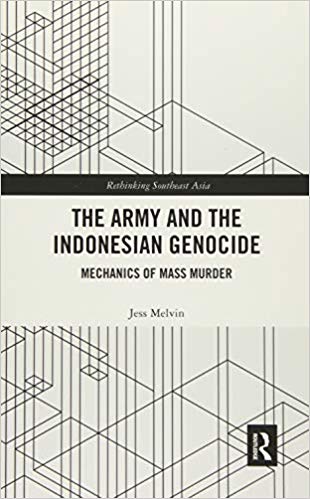 |
 |
 |
B104 Secrecy: The Key to Independence by Laura S. Abrantes & Beba Sequeira
 Twelve women tell their stories of how they fought for Timor-Leste's (East Timor)independence.
Twelve women tell their stories of how they fought for Timor-Leste's (East Timor)independence.
Through oral history interviews, this book illuminates the lives of 12 women who were part of the clandestine independence movement during the Indonesian occupation of Timor-Leste. First published in Tetun in in 2008, this is the first time these stories have appeared in english.
Laura Soares Abrantes was active in the Timorese resistance, gathering information about Indonesian human rights violations and sending it out of the country, both as a student in Java and with women�s organization Fokupers in Dili. She has contributed to many books on Timorese women from 1999 to the present, either as a story-teller, story-collector or editor. Beba Sequeira�s family were involved in the Timorese clandestine movement, leading to her being interrogated by the Indonesian military. After the referendum in 1999, Beba helped establish a women�s organization APSC-TL. Both women tell their own story in [Step by Step: Women of East Timor](#B89 StepbyStep).
Asia Pacific Support Collective Timor-Leste, 2012, 102 pp. $45

Laura S. Abrantes & Beba Sequeira at 2012 Sydney Writers Festival.
"[The women's] work is to realize the dream that should follow independence: of seeing recognition, justice and equality for themselves and their sisters. A similar combination of idealism and pragmatism led to the compilation of this book... Gaining independence has been a giant step, but it is not enough to achieve equality. This book marks the next step: to disclose secrets in plain words that motivate a desire for a deeper form of independence � one based on recognition, justice and equality" -- Niko Leka, Greenleft Weekly
see also:
Buibere: Voice of East Timorese Women
[Step by Step: Women of East Timor, Stories of Resistance and Survival](#B89 StepbyStep)
Secrecy: The Key to Independence
B101 The Independence of East Timor Multi-Dimensional Perspectives - Occupation, Resistance, and International Political Activism by Clinton Fernandes
 A history of the struggle for independence by East Timor, after it was invaded by Indonesia in 1975. The occupation, which lasted 24 years, was immediately resisted. A continuum of effort - between the armed freedom fighters in the mountains, the resilience of urban supporters, and international activism and support - eventually brought about liberation in September 1999. Given that the Timor rebels did not have a land border with a friendly state, nor an external supplier of weapons, nor a liberated area in which to recover between guerrilla operations, their successful resistance is unique in the history of guerrilla warfare and independence struggles. Equally uncommon was an unexpected weapon in the struggle: a remarkable display of strategic nonviolent action. The Independence of East Timor is the first study to integrate all the major factors in East Timor's independence struggle. The multi-dimensional perspectives that are addressed include: Indonesian, US, and Australian diplomacy * Indonesian military operations and activities against the populace * East Timorese resistance at all social levels * human rights abuses * the issue of oil * international diplomacy resulting from global solidarity activism. (Series: Sussex Library of Asian Studies)
A history of the struggle for independence by East Timor, after it was invaded by Indonesia in 1975. The occupation, which lasted 24 years, was immediately resisted. A continuum of effort - between the armed freedom fighters in the mountains, the resilience of urban supporters, and international activism and support - eventually brought about liberation in September 1999. Given that the Timor rebels did not have a land border with a friendly state, nor an external supplier of weapons, nor a liberated area in which to recover between guerrilla operations, their successful resistance is unique in the history of guerrilla warfare and independence struggles. Equally uncommon was an unexpected weapon in the struggle: a remarkable display of strategic nonviolent action. The Independence of East Timor is the first study to integrate all the major factors in East Timor's independence struggle. The multi-dimensional perspectives that are addressed include: Indonesian, US, and Australian diplomacy * Indonesian military operations and activities against the populace * East Timorese resistance at all social levels * human rights abuses * the issue of oil * international diplomacy resulting from global solidarity activism. (Series: Sussex Library of Asian Studies)
Sussex Academic Press, 2011, 274 pp. $35 paperback
The book provides a documented and detailed account of particular events and periods during the Indonesian occupation, in each case assessing the ways in which internal opposition and international actions combined to influence decision-making in Indonesia, the USA, Europe and Australia.... In writing The Independence of East Timor, Clinton Fernandes has opened up an issue of crucial importance in our understanding of the processes by which East Timor attained its independence. John Taylor, Asian Affairs
Professor Fernandes has produced a remarkable study of the main events from the lead-up to the occupation, to the bloody events in 1999. James Dunn, DISSENT (Australia)
Also by Clinton Fernandes
- [Reluctant Indonesians: Australia, Indonesia and the Future of West Papua](#B81Reluctant Indonesians)
B99 A Boy and the Crocodile: The Legend of East Timor Illustrated by children from the Familia Home Orphanage
The Boy and the Crocodile is the legend of East Timor, about how the island of Timor got its curious shape. It is also a parable about kindness, and now a children's book that is benefiting vulnerable kids. The book was illustrated by children from the Familia Hope Orphanage in East Timor, including many who lost their parents in the country's violent struggle for independence. proceeds from sales go to the orphanage.
B99a Labarik Ho Lafaek: Aik-nanoik id husi Timor-Leste Desnhu husi labarik orfenato Familia Hope
Tetum version
Affirm Press, 2011 $20 each, paperback
 B97Making Them Indonesians: Child Transfers Out of East Timor
by Helene Van Klinken
B97Making Them Indonesians: Child Transfers Out of East Timor
by Helene Van Klinken
Approximately 4,000 dependent East Timorese children were transferred to Indonesia during the occupation of East Timor by Indonesia between 1975 and 1999. Many were taken by soldiers to be adopted, others were sent to institutions in Indonesia by government and religious organizations. This book is the first detailed account of the history of the transfer of these children to Indonesia.
Helene van Klinken worked in Java, Indonesia, in university contexts between 1984 and 1991, and 2000 to 2002. She first visited East Timor in 1989 after the territory was opened to outside visitors. In 1999 she worked as a political affairs officer for the United Nations in the lead up to the independence vote, and in 2003 was a volunteer at the CAVR (the Commission for Reception, Truth and Reconciliation in East Timor). Together with Achnesia Felina Manganang, she founded the Istoriaku websiteto assist those transported from East Timor and document their experiences.
"I hope this book will help East Timorese who were taken to Indonesia as children to realise that they are not alone in their experience." � Foreword by Her Excellency Ms Kirsty Sword Gusm�o
Monash University Publishing. 2012 212 pp. $35 paperback
- The Sydney Morning Herald: Fate of East Timor's stolen generation in Indonesia finally coming to light
- The World Today: Renewed hopes for East Timor's 'stolen generation'
- Radio Australia: Lost children of East Timor search for families
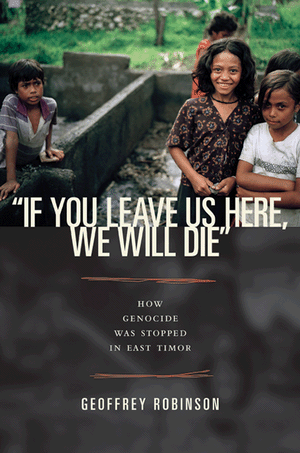 B96"If You Leave Us Here, We Will Die": How Genocide Was Stopped in East Timor
by Geoffrey Robinson
B96"If You Leave Us Here, We Will Die": How Genocide Was Stopped in East Timor
by Geoffrey Robinson
A riveting narrative filled with personal observations, documentary evidence, and eyewitness accounts, "If You Leave Us Here, We Will Die" engages essential questions about political violence, international humanitarian intervention, genocide, and transitional justice. Robinson debunks claims that those committing the violence in East Timor acted spontaneously, attributing their actions instead to the calculation of Indonesian leaders, and to a "culture of terror" within the Indonesian army. He argues that major powers--notably the United States, Australia, and the United Kingdom--were complicit in the genocide of the late 1970s and the violence of 1999. At the same time, Robinson stresses that armed intervention supported by those powers in late 1999 was vital in averting a second genocide. Advocating accountability, the book chronicles the failure to bring those responsible for the violence to justice.
_"[Geoffrey Robinson] is arguably one of the most informed, compassionate outsiders to tell the story of the violence in the small island nation. . . . Even if you don't have much baseline knowledge about the conflicts between these Southeast Asian islands, this book will illuminate the complicated history is accessible terms. Robinson offers crucial perspective on modern colonialism and explores issues of accountability and justice with aplomb."_� Brittany Shoot, Feminist Review
Geoffrey Robinson is professor of history at the University of California, Los Angeles. His books include The Dark Side of Paradise: Political Violence in Bali. Before coming to UCLA, he worked for six years at Amnesty International's headquarters in London. From June to November 1999, he served as a political affairs officer with the United Nations in Dili, East Timor.
Princeton University Press. 2010 344pp. $25 paperback
Reviews:
- Inside Indonesia Review: How genocide was avoided in East Timor(Jan-Mar 2011)
- Pacific Affairs Quarterly,Review by Joe Nevins (March 2011)
- The Economist:A country's agonising birth (February 2010)
- Yet Another Disgrace, New Republic (November 2010)
- Interview with Geoffrey Robinson inUCLA Today (April 2010)
B91 The Circle of Silence: A personal testimony before, during and after Balibo by Shirley Shackleton
 Australian Shirley Shackleton was launched into an unexpected life as a human rights activist when her journalist husband Greg Shackleton was murdered in East Timor in 1975. Her story is filled with a profound sense of purpose, enduring love for her late husband, and a fierce determination to seek truth and justice not only about the events leading up to the murders of the journalists who came to be known as Balibo Five, but for the cause of democracy and freedom in East Timor.
Australian Shirley Shackleton was launched into an unexpected life as a human rights activist when her journalist husband Greg Shackleton was murdered in East Timor in 1975. Her story is filled with a profound sense of purpose, enduring love for her late husband, and a fierce determination to seek truth and justice not only about the events leading up to the murders of the journalists who came to be known as Balibo Five, but for the cause of democracy and freedom in East Timor.
"A compelling personal insight into a defining time in our history. Shirley Shackleton's courage is inspiring.
� Robert Connolly, Director, Balibo
_Shirley Shackleton�s book is an exceptional personal narrative in this year�s field of rich Australian journalism, history and analysis. It is exceptional because of its raw intellectual honesty forged from murder and massacre in East Timor during a cover-up which prevailed for 25 years. It is exceptional because it confronts then exposes blind-eyed Australian diplomacy. It confronts then exposes self-censorship posing as journalism, because of the Australia/US/Indonesia geopolitical logic which required it. From ordinary human expectations, the author�s personal story � with sometimes brutal self-assessment � evolves from self-pity and grief over the 1975 murders at Balibo and Dili to a campaign to raise public consciousness about atrocities which decimated the people of East Timor. The consequence of that raised consciousness? Independence for East Timor in 2002 and a measure of belated redemption for Australia and the international community._The Circle of Silence is Shirley Shackleton�s testimony from her life�s darkest hour at the death of her husband Greg to vindication and relief at the survival of a people who struggled for their freedom. Judges� comments, Walkley Book Award
Murdoch Books 2010 320 pp. $40 paperback
Winner ofThe Walkley Book Award for 2010
---
B100 Balibo byJill Jolliffe
 In October 1975, five young television reporters travelled from Australia to report on the brewing unrest in the region. It was a journey that would be their last: The Balibo 5, as they came to be known, were killed by the Indonesian military as they filmed the infantry troops advancing into the border town of Balibo. In the months that followed, freelance journalist Roger East, who went to investigate their fate, was also executed. The result of over 30 years of personal investigations and tireless research, Balibo provides a unique first-hand account of the deaths of the five journalists and East.This revised edition of the book originally published as Cover-Up, on which the film Balibo is based, reveals previously hidden details of one of this shameful episode.JillJolliffe argues that the Australian government and its Western allies were always aware of the circumstances of the killings of the Balibo5and that their cover-up of those details was a key factor in Indonesia�s decision to invade and occupy East Timor.
In October 1975, five young television reporters travelled from Australia to report on the brewing unrest in the region. It was a journey that would be their last: The Balibo 5, as they came to be known, were killed by the Indonesian military as they filmed the infantry troops advancing into the border town of Balibo. In the months that followed, freelance journalist Roger East, who went to investigate their fate, was also executed. The result of over 30 years of personal investigations and tireless research, Balibo provides a unique first-hand account of the deaths of the five journalists and East.This revised edition of the book originally published as Cover-Up, on which the film Balibo is based, reveals previously hidden details of one of this shameful episode.JillJolliffe argues that the Australian government and its Western allies were always aware of the circumstances of the killings of the Balibo5and that their cover-up of those details was a key factor in Indonesia�s decision to invade and occupy East Timor.
'This book brings all her evidence together. The centrepiece is the most comprehensive collection so far of interviews of East Timorese with links to the Balibo incident, which highlights the abundance of evidence available for the prosecution of those responsible, among them Captain Yunus Yosfiah (now a retired lieutenant-general), and a Kopassus (special forces) sergeant, Christoforus da Silva. Interwoven with this extraordinarily detailed work are strands of a personal memoir.' -Jim Dunn (Sydney Morning Herald)
_No one could hope to match Jolliffe for knowledge � Her book is sensible, well-told, compassionate, balanced and clean of malice.-_Paul Toohey (The Australian)
_This updated version of her earlier book, Cover-Up, reconstructs these tragic events and interweaves Jolliffe's own investigations as a long-time reporter in East Timor. It's a grim story, painstakingly told. The truth maybe out but neither Jakarta nor Canberra show any will to bring the affair to a "dignified close". -_Fiona Capp (The Age)
Jill Jolliffe has been following the Balibo5 story for more than three decades. She witnessed the first incursions of Indonesian regular troops into East Timor in September 1975, reported on the death of her five colleagues at Balibo in October, and was evacuated from Dili by the International Red Cross four days before Indonesian paratroopers attacked the capital on 7 December 1975.In 1978 Jolliffe moved to Portugal, where she continued to follow the East Timor story and to work as a correspondent for The Guardian, The Sunday Times, The Age, the Sydney Morning Herald, and the BBC, among others. She now lives in Darwin and reports regularly from East Timor.
Reviews inGreen Left Weekly,Jakarta Globe
Scribe Publications 2009 416 pp $25 paperback
B92 Peace of Wall: Street Art from East Timor
by Chris Parkinson (foreword by Jose Ramos-Horta)
 The images and words adorning the walls of East Timor reflect the country's tumultuous history, precarious present and hopeful future. They endow the social landscape with a rawness and honesty absent from their media, and echo the struggle towards new nationhood. Peace of Wall is widely contradictory, emotionally charged, instantly engaging and consistently dramatic. It's life in East Timor.
The images and words adorning the walls of East Timor reflect the country's tumultuous history, precarious present and hopeful future. They endow the social landscape with a rawness and honesty absent from their media, and echo the struggle towards new nationhood. Peace of Wall is widely contradictory, emotionally charged, instantly engaging and consistently dramatic. It's life in East Timor.
Chris Parkinson spent four years living and working in East Timor. Throughout this time, he documented the changing political and social climate in East Timor through its street art. He amassed over 3000 photographs and hundreds of hours of interviews. Peace of Wall showcases a selection of these inspirational stories and artwork.
Affirm Press 2010 191 pp. Full-color, Flexibound $35
 B89Step by Step: Women of East Timor, Stories of Resistance and Survival
B89Step by Step: Women of East Timor, Stories of Resistance and Survival
Edited by Jude Conway
Thirteen outspoken East Timorese women to tell their life stories: what it was like living in a Portuguese colony; how they were affected by the Indonesian invasion; what day to day life was like under the occupation or in the diaspora; how they contributed to the resistance; and how they have adapted to the stark contrast of independence.
These are the stories of C�u Lopes Federer, Dulce Vitor, Maria Dias, Laura Soares Abrantes, Domingas �Micato� Fernandes Alves, Cesarina Rocha, Carolina do Ros�rio, Mica Barreto, Lucia Lobato, Isabel �Beba� Sequeira, Ina Varella Bradridge, Luisa Ferreira Exposto and Filomena Reis.
Charles Darwin University Press 2010. 241 pp. $44 paperback
Review by Jen Hughes from ETAN blog
see also
Buibere: Voice of East Timorese Women
Secrecy: The Key to Independence
 B90 Xanana: Leader of the Struggle for Independent Timor-Leste
B90 Xanana: Leader of the Struggle for Independent Timor-Leste
By Sarah Niner
The charismatic Xanana Gusm�o shouldered the herculean task of leading his East Timorese people to independence. During the brutal 24-year war with Indonesia, he was transformed through crisis from being a young apolitical outsider into a hardened guerrilla commander and keen political strategist, who ultimately became the central unifying figure of East Timorese nationalism. This book focuses on his years in leadership and seeks to explain how the events of the time affected the development of his ideas, policies and strategies.
Australian Scholarly Publishing 2010. 296 pp. $40 paperback
see also Timor Lives! Speeches of Freedom and Independence by Xanana Gusm�o
 B94Locating Democracy: Representation, Elections and Governance in Timor-Leste
B94Locating Democracy: Representation, Elections and Governance in Timor-Leste
edited by Steven Farram Papers from a symposium organized in Dili in response to the local government and decentralization reform policies of the Timor-Leste government. Part of the reform program is the establishment of municipal assemblies, with the aim of making democracy more representative. The symposium featured a spirited discussions about the whole reform process and a range of views were expressed on the best way forward. Erudition, clarity and a keen comprehension of the issues at hand were features of the presentations at the symposium and this selection of the papers brings those same qualities to the ongoing debate on this important subject.
Steven Farram is a research associate at Charles Darwin University. His research interests are the history and politics of the Northern Territory, Indonesia and Timor-Leste.
Charles Darwin University Press 2010. 70pp $30 paperback
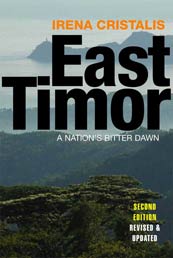 B87East Timor: A Nation's Bitter Dawn
by Irena Cristalis This book tells the story of the traumatic creation of Asia's youngest country, East Timor, which has been struggling to rebuild itself ever since the mayhem of Indonesia's reluctant withdrawal in 1999. The author, one of a mere handful of journalists who refused to be evacuated in the final days of the Indonesian occupation, provides a vivid first-hand account of the lives of individual Timorese during the occupation, their struggle for freedom and their endeavors to rebuild their homeland. Based on years of research, and lengthy interviews with East Timor 's leaders, priests, nuns, students and guerrilla fighters, this moving and extremely readable book is at the same time also an exploration of the complexities of the country's internal politics. Irena Cristalis is a Dutch journalist and photographer, who been based in throughout Asia. Her past locations have included Hong Kong, Beijing, Bangkok, New Delhi and East Timor. Zed Books. 2009 384 pp. $35
B87East Timor: A Nation's Bitter Dawn
by Irena Cristalis This book tells the story of the traumatic creation of Asia's youngest country, East Timor, which has been struggling to rebuild itself ever since the mayhem of Indonesia's reluctant withdrawal in 1999. The author, one of a mere handful of journalists who refused to be evacuated in the final days of the Indonesian occupation, provides a vivid first-hand account of the lives of individual Timorese during the occupation, their struggle for freedom and their endeavors to rebuild their homeland. Based on years of research, and lengthy interviews with East Timor 's leaders, priests, nuns, students and guerrilla fighters, this moving and extremely readable book is at the same time also an exploration of the complexities of the country's internal politics. Irena Cristalis is a Dutch journalist and photographer, who been based in throughout Asia. Her past locations have included Hong Kong, Beijing, Bangkok, New Delhi and East Timor. Zed Books. 2009 384 pp. $35
see also Bitter Dawn: East Timor A People's Story 1st edition of East Timor: A Nation's Bitter Dawn
 B86 Unfinished Nation: Indonesia Before and After Suharto
B86 Unfinished Nation: Indonesia Before and After Suharto
by Max Lane
Unfinished Nation traces the evolution of Indonesia from its anti-colonial stirrings in the early twentieth century to the lengthy, and eventually victorious, struggle against the dictatorship of President Suharto. Lane describes how small resistance groups inside the country directed massive political transformation. It shows how the real heroes were the Indonesian workers and peasants, whose sustained mass direct action was the determining force in toppling one of the most enduring dictatorships of modern times. Taking in the role of political Islam, and with considerations on the future of this fragmented archipelagic nation, Unfinished Nation is an illuminating account of modern Indonesian history.
Max Lane is Visiting Fellow, Department of Malay Studies, National University of Singapore. In addition to numerous academic publications, he has actively supported political change in Indonesia since the mid-1970s, and has translated work by the acclaimed Indonesian novelist Pramoedya Ananta Toer, including the famed Buru Quartet.
Reviews in South China Morning Post,Direct Action
Verso. 2008. 312 pp. $30
Books on Indonesia, West Papua, and Aceh
B78 Resistance: A Childhood Fighting for East Timor by Naldo Rei
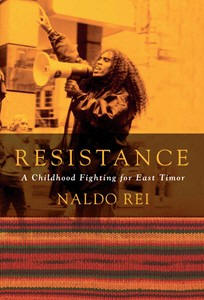
Naldo Rei was just six months old when Indonesia invaded East Timor in December 1975. He spent the first three years in the jungle, where his family had fled for safety. After his father was murdered for his work in the resistance movement, nine-year-old Naldo was recruited by the clandestine Fretilin network and began his own extraordinary journey fighting for East Timor's freedom. Throughout his teenage years, Naldo was imprisoned and tortured regularly for his covert resistance to the brutal Indonesian regime. Eventually, in too much danger to remain in his homeland, he escaped to Indonesia and then Australia for several years. Now living in an independent East Timor, Naldo Rei can tell his incredible story. His life is proof that no amount of danger and loss can crush the human spirit.
B80 Shakedown: Australia's Grab for Timor Oil
by Paul Cleary
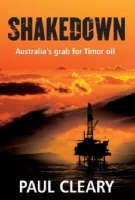
The compelling inside story of how Australia attempted to bully East Timor out of its rights to the lucrative oil and gas resources of the Timor Sea and the people, both heroes and villains, who played the game for a nation's future.JournalistPaul Cleary, a former East Timor government adviser, gives a gripping insider's account of the six years of bruising negotiations between Australia and East Timor. He saw how the Timorese pulled off one of the great David and Goliath feats of the region but then were unable to lay the foundations for a peaceful future. In this compelling insight into Australia's international operations, Cleary exposes the heroes and villains who emerged in a one-hundred-billion-dollar shakedown.
Allen and Unwin. Australia. 2007. 304 pp. $35
The Australian: Oil comes between helpful neighbours
Eureka Street:Shakedown: Australia's grab for Timor oil
Green Left Weekly: Shakedown: Australia's grab for Timor oil
Far Eastern Economic Review: Shakedown: Australia's grab for Timor oil
Spying fears haunted Timorese during oil talks
 B79Sunrise LNG in Timor-Leste: Dreams, Realities and Challenges
B79Sunrise LNG in Timor-Leste: Dreams, Realities and Challenges
A Report by La�o Hamutuk, Timor-Leste Institute for Reconstruction Monitoring and Analysis
By Guteriano Neves, Charles Scheiner and Santina Soares
This report discusses the possible positive and negative impacts of a Liquefied Natural Gas (LNG) plant in Timor-Leste to process gas from the offshore Greater Sunrise field for export. Petroleum will be the most important factor in Timor-Leste�s economy and government budget for the foreseeable future.
Petroleum will be the most important factor in Timor-Leste�s economy and government budget for the foreseeable future. Revenues from oil and gas already comprise 50% of the country�s Gross National Income (GNI) and supply more than 90% of its government revenues. It is the hope of many Timorese, including the Timor-Leste government, that Timor-Leste will profit from downstream (refining, processing and gas liquefaction). The most likely near-term possibility for this is an undersea pipeline from the Greater Sunrise gas field to the shore of Timor-Leste, with a liquefaction plant and Liquefied Natural Gas (LNG) tanker port to process the gas and ship it overseas.
People are imagining the wonderful things that will happen if the pipeline comes onshore in Timor-Leste: it will stimulate local economic development, spin off to boost the local and national economy, and create employment opportunities for Timorese workers. However those dreams and expectations will be difficult to realize in Timor-Leste in the current context of the new nation. The fragility and inexperience of state institutions, lack of human resources, inability to execute the budget must be overcome before a project like the Sunrise LNG plant can be used safely and effectively to benefit current and future generations.
February 2008. 131 pp.
Printed copies (English) are available for 20,orCDfor20, or CD for 20,orCDfor10.
B64 Timor-Leste Land of Discovery
by Dan Groshon This gorgeous coffee table picture book illustrates the great beauty of new nation's landscape and people. An ideal gift.
This gorgeous coffee table picture book illustrates the great beauty of new nation's landscape and people. An ideal gift.
I am Timorese, living abroad (in Portugal), since I was 11 years old. I want to thank you for your book, Timor-Leste Land of Discovery, which gives me some images of Timor, my homeland, that I left 24 years ago. The images are absolutely fantastic and many are of parts of Timor still unknown to me. Timor-Leste Land of Discovery gives me a fantastic free journey to Timor where I hope one day I can return. The title of the book is a perfect resume of the images that you can find within. -- �ngelo Gon�alves
This book brings new images of this new land. This book will surely offer everyone great unforgettable moments of contemplation on the natural beauties of Timor-Leste. -- President Kay Rala Xanana Gusm�o.
These evocative photographs present our culture and our traits in a way no other book has done before. Jos� Ramos-Horta
TAYO PHOTO GROUP Ltd. 2006. Hardcover, large-format, 189 pp.
$50

Profile of photographer in The Oregonian
HK Magazine review of Timor-Leste Land of Discovery
 B76The Crisis in Timor-Leste: Understanding the Past, Imagining the Future
edited by Dennis Shoesmith
B76The Crisis in Timor-Leste: Understanding the Past, Imagining the Future
edited by Dennis Shoesmith
A collection of papers originating in a symposium, The Crisis in Timor-Leste: Understanding the Past, Imagining the Future, held at Charles Darwin University, 13 November 2006. The papers in this volume address the historical, social and political causes of unrest in Timor-Leste, explaining the violence and rebellion of 2006 in a larger context. By doing this they identify ways to respond to the causes of unrest. Contributors: James Cotton, Jennifer Drysdale, Steven Farram, Trevor Le Lievre, Andrew McWilliam, Ron May, David Mearns, Rod Nixon, Kate Reid-Smith, Dennis Shoesmith.
Charles Darwin University Press. 2007. 115 pp. $25
B82 Democratic Governance in Timor-Leste: Reconciling the Local and the National
edited by David Mearns

In February 2008, three days after the Darwin conference from which thisbookarose, violent attacks took place on the president and prime minister of Timor-Leste. Some contributors revised their papers for publication in light of the horrifying attacks. The result is an important collection of articles that provides highly pertinent insights into the current dilemmas of the government and people of the new republic. The book gives voice to East Timorese commentators as well as to Australian and other international scholars
The book explores the necessity to come to terms with the past in order to move on to a better future. It also considers the role of the state and parliament in the new democracy while seeking to set these against the cultural and social practices of the people at whom development is aimed. Finally, it examines the role of the agencies that have sought to assist in the country�s transformation from a colonized to a post-colonial society with a sound economic future.
Foreword by Deputy Prime Minister of Timor-Leste, Dr. Jos� Luis Guterres. Contributing are Fernanda Borges, Fiona Crockford, Annette Field, James J. Fox, Mark Green, Damian Grenfell, Jill Jolliffe, Damien Kingsbury, Andrew McWilliam, Andrew Marriott, Akihisa Matsuno, David Mearns, Sara Niner, Yukako Sakabe, Dennis Shoesmith, Pyone Myat Thu, Josh Trindade, and Bu V.E. Wilson.
Charles Darwin University Press 2008. 270 pp.
$35
B61 Masters of Terror: Indonesia's Military and Violence in East Timor Edited by Richard Tanter, Desmond Ball, and Gerry van Klinken Foreword by Noam Chomsky

The terror campaign by pro-Indonesian armed groups before, during, and after East Timor's independence referendum in 1999 was a blatant challenge to the international community as many of the acts of murder, political intimidation, destruction, and mass deportation took place before the eyes of the world. Yet the ultimate responsibility has been denied and obscured. Masters of Terror provides an authoritative analysis and documentation of the brutal operations carried out by the Indonesian army and its East Timorese allies. The authors carefully assemble detailed accounts of the actions of the major Indonesian officers and East Timorese militia commanders accused of gross human rights violations. This indispensable work explores a horrific frontal attack on democracy and calls for the establishment of an international tribunal for crimes against humanity in East Timor.
Contents: Introduction Hamish McDonald and Richard Tanter; Masters of Terror: The Indonesian Findings Hamish McDonald; Full Report of the Investigative Commission into Human Rights Violations in East Timor KPP HAM; The Key Suspects: An Introduction Gerry van Klinken, David Bourchier and Douglas Kammen; Crimes against Humanity in East Timor 1999: The Key Suspects Gerry van Klinken and David Bourchier; Practical Justice in Doe v. Lumintang: The Successful Use of Civil Remedies against "an Enemy of All Mankind" Richard Tanter; Silent Witness: Australian Intelligence and East Timor Desmond Ball
Rowman & Littlefield Publishers, Inc. 2006. 272 pp.
$27 paperback
B65 Negligent Neighbour New Zealand's Complicity in the Invasion and Occupation of Timor-Leste by Maire Leadbeater
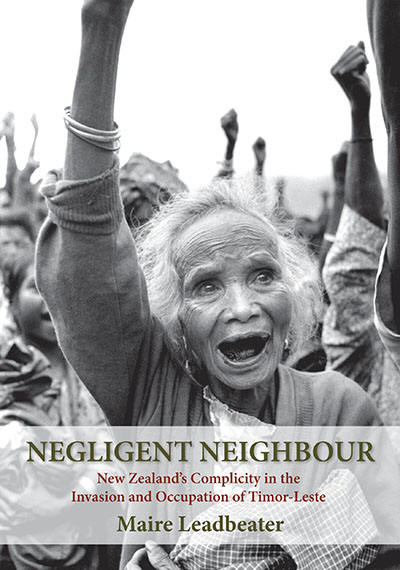
For almost a quarter century the people of East Timor lived and died under Indonesia's colonial yoke. Against all the odds East Timor's resistance survived. Indonesia relied on western support for both the invasion and occupation of East Timor, but New Zealand's role is often forgotten or mentioned only in passing. Maire Leadbeater is spokesperson for the Auckland-based Indonesia Human Rights Committee, and in the 1990s she was a prominent campaigner for East Timor's independence. Prior to that she took a leading role in New Zealand's anti-nuclear movement. Her writing and lobbying is motivated by the conviction that New Zealand's foreign policy must change direction away from narrow 'self interest' to principled advocacy for peace and justice.
Negligent Neighbour is a brilliant book that reminds us NZ foreign policy, like that of other Western capitalist nations, is too often on the side of the oppressor rather than the oppressed. -Cameron Walker, Scoop
Maire Leadbeater's "personal recollections and experiences in the East Timor solidarity movement add considerable strength and authenticity to her chronicle, which also draws on declassified official documents, historical research and interviews with key players... >Leadbeater notes how she was shocked to find that �almost every new batch of documents revealed new examples of the high-level subterfuge officials relied on as they plotted to help Indonesia deflect international criticism�." -Paul Barber, Tapol
See also:
NZ Herald: Restless ghosts of the Balibo Five New Zealand Sunday Star Times review<
Green And Labour Politicians Launch Timor Book
Interview with Maire Leadbeater on YouTubePart 1,Part 2
Craig Potten, New Zealand. 2007. 280 pp.
$35
| Order from Amazon, Support ETAN | |||||
|---|---|---|---|---|---|
 |
 |
 |
 |
 |
 |
MATERIALS FROM TIMOR-LESTE'S COMMISSION ON RECEPTION, TRUTH AND RECONCILIATION (CAVR)

B69 Executive Summary of Chega! The Report of the Commission on
Reception, Truth and Reconciliation (CAVR)
CAVR, 215 pp. $15
 SOLD OUT! B70 Timor-Leste Women and the Conflict National Public Hearing, SOLD OUT!
April 28-29, 2003
SOLD OUT! B70 Timor-Leste Women and the Conflict National Public Hearing, SOLD OUT!
April 28-29, 2003
CAVR, 64 pp. $8
B71 Timor-Leste Massacres National Public Hearing, November 19 -21, 2003
CAVR, 64 pp. $8
B72 Timor-Leste Forced Displacement and Famine National Public Hearing July 28-29, 2003
CAVR, 64 pp. $8
 B73 Rona Ami-nia Lia Hear Our Voices
B73 Rona Ami-nia Lia Hear Our Voices
This small book comprises photos of East Timorese who shared their stories of pain and suffering with CAVR. Beautifully photographed by the Indonesian photographer Poriaman Sitanggang, the collection also includes short statements by these victims about their ideas for the future in Timor-Leste. Text is in Tetum and English.
CAVR, 32 pp. $8
 B63Complicity in Genocide: Report to the East Timor "Truth Commission" on International Actors
by Geoff C. Gunn
B63Complicity in Genocide: Report to the East Timor "Truth Commission" on International Actors
by Geoff C. Gunn
Originally commissioned by East Timor's Commission for Reception, Truth and Reconciliation (CAVR). This report focuses on the role of international actors in East Timor's tragedy. Chapters focus on the UN, international diplomacy, weapons supply, the media, church and international solidarity.
Tipgrafia Macau Hung Heng. 2006. 242 pp. $25 paperback
Also **[East Timor and the U.N.: The Case for Intervention](#Gunn ET and UN),**By Geoffrey C. Gunn. UN documents, with commentary and call to action. Africa World Press, US, 1997. 240 pp. $20
B56 Songs of East Timor & Oceania by Canberra Union Voices

A songbook/CD set with scores for four part choir, words, translations and background information for eighteen songs of significance and beauty from Oceania.
There are songs of the East Timorese struggle for self determination since 1973 (including the national anthem), Australian Aboriginal and Torres Strait Islander songs, and songs from the Pacific.
The East Timorese community and others gave advice and assistance.
2005. 52 pp., spiral bound with audio CD. $25
B55 A Not-So-Distant Horror: Mass Violence in East Timor by Joseph Nevins
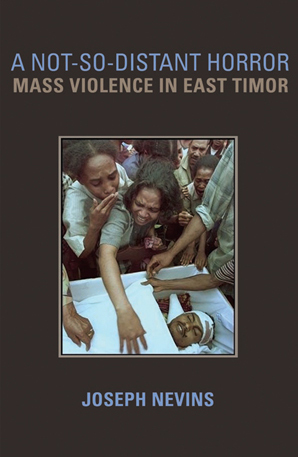 On August 30, 1999, in a United Nations�sponsored ballot, East Timor voted for independence from Indonesia and for an end to a brutal military occupation. Upon the announcement of the result, Indonesian troops and their paramilitary proxies launched a wave of terror that, over three weeks, resulted in the murder of more than 1,000 people, the rape of untold numbers of women and girls, the razing of 70 percent of the country�s buildings and infrastructure, and the forcible deportation of 250,000 people. In recounting these horrible acts and the preceding events, Joseph Nevins shows that what took place was only the final scene in more than two decades of atrocities. More than 200,000 people, about a third of the population, lost their lives due to Indonesia�s 1975 invasion and subsequent occupation, making the East Timorese case proportionately one of the worst episodes of genocide since World War II.
On August 30, 1999, in a United Nations�sponsored ballot, East Timor voted for independence from Indonesia and for an end to a brutal military occupation. Upon the announcement of the result, Indonesian troops and their paramilitary proxies launched a wave of terror that, over three weeks, resulted in the murder of more than 1,000 people, the rape of untold numbers of women and girls, the razing of 70 percent of the country�s buildings and infrastructure, and the forcible deportation of 250,000 people. In recounting these horrible acts and the preceding events, Joseph Nevins shows that what took place was only the final scene in more than two decades of atrocities. More than 200,000 people, about a third of the population, lost their lives due to Indonesia�s 1975 invasion and subsequent occupation, making the East Timorese case proportionately one of the worst episodes of genocide since World War II.
In A Not-So-Distant Horror, Nevins reveals the international complicity at the center of the East Timor tragedy. In his view, much if not all of the horror that plagued East Timor in 1999 and in the 24 preceding years could have been avoided had countries like Australia, Japan, the United Kingdom, and especially the United States, not provided Indonesia with valuable political, economic, and military assistance, as well as diplomatic cover. The author explores issues of accountability for East Timor�s plight and probes the meaning of what took place in terms of international institutions and law. Examining issues such as violence, the geography of memory, and social power, Nevins makes clear that the case of East Timor has much to tell us about the contemporary world order.
�Joseph Nevins�s book is a magnificent memorial to the people of East Timor and a damning indictment of international powers, like the United States, that armed, trained, and financed the Indonesian army�s quarter-century reign of terror. Nevins eloquently moves from the horrifying reality of the slaughter on the ground to the international political elite who allowed it to happen, and go unpunished. A_nt-So-Distant Horror_ goes beyond Timor because the bravery and endurance of the people of East Timor are a lesson to us all.� �Amy Goodman, Host and Executive Producer, Democracy Now!
�Joseph Nevins has performed a great service with this book. Among all the massacres that lead politicians to solemnly promise �never again��the Armenian genocide, the Holocaust, Rwanda�the ruthless Indonesian rule and mass murder that took place in East Timor is almost always ignored. Nevins carefully and vividly places this tragic chain of events on the record, and shows how much of the responsibility for these deaths rests squarely on the United States and its allies.��Adam Hochschild
�The struggle of the people of East Timor for survival, against incredible odds, is a truly inspiring achievement, one of the most astonishing of recent history. This remarkable book combines depth of knowledge and compassionate understanding, with intimate familiarity from the ground to the historical-documentary record, and the broader geopolitical and cultural-moral context. Joseph Nevins accurately describes the horrors as �not-so-distant.� That is a painfully accurate assessment...��[Noam Chomsky](#Noam Chomsky)
Joseph Nevins teaches in the Department of Geology and Geography, Vassar College. He is the author of Operation Gatekeeper: The Rise of the �Illegal Alien� and the Making of the U.S.-Mexico Boundary. He is a co-founder of the East Timor Action Network. Under the pen name Matthew Jardine, he is the author of East Timor: Genocide in Paradiseand the coauthor of East Timor�s Unfinished Struggle: Inside the Timorese Resistance
Cornell University Press June 2005 288 pp. Paperback. $19
Review by John M. Miller in Nonviolent Activist: Close to Home; Review in the Economist;Tapol Bulletin; NZ Herald;Foreign Service Journal; [New Zealand International Review](../et2006/february/06-12/00thepri.htm#NZ Intl Review);National Catholic Reporter; Annals of the Association of American Geographers[](../et2006/february/06-12/00thepri.htm#NZ Intl Review)
**** Wear, Carry, Give ETAN**
T-shirts, sweatshirts, long-sleeved shirts, mugs, water bottles, kid clothes, bags, notebooks, kids clothes and more. Two designs!
B47 A Woman of Independence by Kirsty Sword Gusm�o

From her first visit to East Timor in 1990, Kirsty Sword fell in love with the country and its people and became determined to help them in their seemingly hopeless struggle for independence. Little did she know then where her passion for the cause would lead her.
Over the next decade, Kirsty worked as an undercover activist in Jakarta, becoming an increasingly valuable operative within the East Timorese independence movement. In 1994 her work brought her into contact with the jailed leader of the resistance movement, the charismatic Xanana Gusm�o. Through their letters, smuggled in and out his prison, they fell in love. This unlikely but remarkable romance, no less passionate for their being so forcibly separated, was further tested when Kirsty was compelled to flee Indonesia one step ahead of its feared intelligence service. It was not until the fall of President Suharto and Xanana�s subsequent release from prison that Kirsty was finally reunited with the revered independence leader.
Working beside Xanana, Kirsty found herself at the very centre of the epic events that saw East Timor freed from Indonesian occupation: the vote for independence, the militia groups� murderous rampage that followed, the intervention of Australian and international peacekeeping forces, and the slow and painful rebuilding of a devastated country. Today, the former guerrilla commander and the activist live together as president and first lady, with their two children, in a country where fear has been replaced by hope. A Woman of Independence is the story of an incredible love affair, and the passion and courage it takes to free a nation.
Kirsty Sword Gusm�o was born in Bendigo, Victoria. She studied Indonesian at university, and later taught English in Jakarta as a cover for her work for the East Timorese resistance movement. She is married to Xanana Gusm�o, now the president of East Timor, and has two young children.
Macmillan Australia. November 2003. 321 pp.
$35
Reviews: Sydney Morning Herald;Courier Mail;Mercury
Profiles and Interviews of Kirsty Sword Gusm�oDutiful Life;Sydney Morning Herald
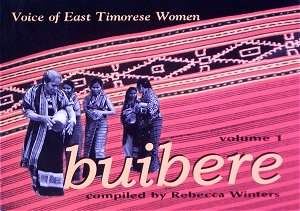 B22 Buibere: Voice of East Timorese Women
B22 Buibere: Voice of East Timorese Women
Stories told by 20 women living in East Timor, compiled by Rebecca Winters.
Benefits Timor Aid, to assist victims of rape and torture in East Timor.
106 pp. East Timor International Support Centre, Australia. 1999.$12
 B40 The Road to Freedom:
A Collection of Speeches, Pastoral Letters and Articles from 1997-2001
B40 The Road to Freedom:
A Collection of Speeches, Pastoral Letters and Articles from 1997-2001
by Carlos Filipe Ximenes Belo, SDB This collection of Nobel Laureate Bishop Belo's speeches and writings reveal his longing for East Timor to become a free and just society. They deal with reconciliation and refugees, health and human rights, democracy and the church. They are inspirational reading for anyone who shares Belo's belief that a nation might come to enshrine the best human qualities. Color photos.
Caritas Australia and the Centre for Peace and Development Studies East Timor. 2001. 72 pp. $5 paperback.
 B41 Fighting Spirit of East Timor: The Life of Martinho da Costa Lopes
B41 Fighting Spirit of East Timor: The Life of Martinho da Costa Lopes
by Rowena Lennox
Martinho da Costa Lopes was the first Timorese leader of the East Timorese Catholic Church. After the Indonesian invasion of East Timor in 1975, he worked tirelessly to protect human rights. He was the first person to speak out publicly within East Timor about the abuses perpetrated by the occupation forces, which attracted criticism from the Indonesian government. Under pressure from the Vatican, he resigned from the position of Apostolic Administrator and left his country in 1983. He then traveled extensively, speaking and raising awareness about East Timor. He died in Portugal in 1991. His story is a unique and accessible behind-the-scenes account of East Timor.
Pluto Press/Zed. 2001. $22.50 paperback
 B36The Trial of Henry Kissinger
B36The Trial of Henry Kissinger
by Christopher Hitchens
"I find it contemptible." �Henry Kissinger
"An eloquent and devastating indictment of Henry Kissinger's involvement in the war in Indochina, genocide in East Timor and many other acts of indiscriminate murder." � The Village Voice
"His own lonely impunity is rank; it smells to heaven. If it is allowed to persist then we shall shamefully vindicate the ancient philosopher Anacharsis, who maintained that laws were like cobwebs; strong enough to detain only the weak, and too weak to hold the strong. In the name of innumerable victims known and unknown, it is time for justice to take a hand."
Weighing the evidence with judicial care, and developing his case with scrupulous parsing of the written record, Hitchens takes the floor as prosecuting counsel. He investigates, in turn, Kissinger�s involvement in the war in Indochina, mass murder in Bangladesh, planned assassinations in Santiago, Nicosia and Washington, D.C., and genocide in East Timor. Drawing on first-hand testimony, previously unpublished documentation, and broad sweeps through material released under the Freedom of Information Act, he mounts a devastating indictment of a man whose ambition and ruthlessness have directly resulted in both individual murders and widespread, indiscriminate slaughter.
Christopher Hitchens lives in Washington, D.C. and writes columns for Vanity Fair.
Verso. 2001. 160 pp. Paperback**$12**
 B75 The Testimony Project: Papua
by Charles E. Farhadian, photographs by Stephan Babuljak
B75 The Testimony Project: Papua
by Charles E. Farhadian, photographs by Stephan Babuljak
A collection of histories in West Papua. Twelve West Papuans speak for themselves, movingly present their life stories in 'raw narratives' as if the interviewees were speaking directly to the reader. Introduction by Ed McWilliams. Dr. Charles Farhadian, who edited the book, explains: "The goal in creating the book is two-fold. First, it is crucial that Papuans get a chance to speak for themselves, rather than being reinterpreted or silenced for any number of reasons and by any number of people. By speaking for themselves, Papuans demonstrate they are actors in their own right. Second, it is equally important to provide an historical document that records the lives of Papuans at the beginning of the 21st century."
�This book is the first of its kind. It dignifies Papuans and lets us speak on our own terms.�
-- Father Neles Tebay, Bishop of Jayapura, Papua
"The Testimony Project: Papua challenges the standardized or idealized views of Papuans.�
-- Rev. Dr. Benny Giay, Professor of Church & Society, Papua
Penerbit Deiya. 2007. 125 pp. $20
B81 Reluctant Indonesian: Australia, Indonesia and the Future of West Papua
by Clinton Fernandes
 Clinton Fernandes traces the history of West Papua from the colonial era to its incorporation and full-scale transformation under Indonesian rule, and offers a penetrating analysis of the problems posed by the rise of the West Papuan independence movement for Australia�s relations with Indonesia. Reluctant Indonesians issues a timely, provocative, and profound challenge to the orthodox views of the foreign policy establishment and its various supporters in the media. It is essential reading for those interested in West Papua, Australia�s relationship with Indonesia, and Australian foreign policy in general.
Clinton Fernandes traces the history of West Papua from the colonial era to its incorporation and full-scale transformation under Indonesian rule, and offers a penetrating analysis of the problems posed by the rise of the West Papuan independence movement for Australia�s relations with Indonesia. Reluctant Indonesians issues a timely, provocative, and profound challenge to the orthodox views of the foreign policy establishment and its various supporters in the media. It is essential reading for those interested in West Papua, Australia�s relationship with Indonesia, and Australian foreign policy in general.
'Fernandes�s book is a good, succinct yet reasonably comprehensive introduction to the issues and the broad political landscape of West Papua. Importantly though, it has a message of hope. -'West Papua's struggle for justice', Vannessa Hearman Green Left Weekly
'Reluctant Indonesians is a hard-hitting and well documented book which makes it a very valuable addition to the growing volume of books now available about West Papua.' TAPOL: The Indonesian Human Rights Campaign
Clinton Fernandes is senior lecturer in strategic studies at University College, the University of New South Wales. He specialises in international relations and strategy with a focus on the 'national interest' in Australia's external relations.
also by Clinton Fernandes:
Scribe. 2006. 138 pp.
$22
Also by Clinton Fernandes: The Independence of East Timor: Multi-Dimensional Perspectives - Occupation, Resistance, and International Political Activism
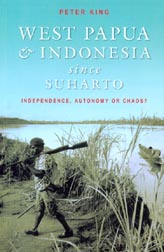 B54 West Papua and Indonesia since Suharto: Independence, Autonomy or Chaos?
B54 West Papua and Indonesia since Suharto: Independence, Autonomy or Chaos?
by Peter King
In the 1950s, the people of West Papua (then Dutch New Guinea) were promised self-determination and eventual independence by their colonial masters. But in 1963 Indonesia took over the territory with the blessing of the United States, the United Nations, and Australia. This book reviews the long guerrilla struggle of the Organisasi Papua Merdeka (OPM) for a Free Papua and traces the rise of a non-violent independence movement alongside it led by the Papua Council Presdium following the fall of Indonesia's military dictator General Suharto in 1998.
Traveling extensively in West Papua and throughout Indonesia, Peter King has interviewed leading figures from the West Papuan Independence movement, church groups, and human rights NGOs. West Papua and Indonesia since Suharto places the current Papuan struggles in a context of failing Indonesian reform.
Peter King is a research associate in government and international relations at the University of Sydney.
University of NSW Press, 2004, 240 pp. $24.95
"King argues passionately and persuasively that international intervention to resolve Papua�s plight is essential: Australia, the US and other countries must act in concert through the UN once more, as they did in East Timor. Indonesians must be persuaded that their best interests lie not in a �security approach� but in dialogue and negotiation with the Papuans and other disenchanted minorities."
Read review:West Papua�s long struggle for justice
Books on Indonesia, West Papua, and Aceh
 B93Interfaith Endeavours for Peace in West Papua
B93Interfaith Endeavours for Peace in West Papua
by Fr. Neles Tebay Pontifical Mission Society, Aachen, Germany, 2006 76 pp. $5
Packed with facts like this about the plight of the Papuan people, this short book is an indispensable read for activists and anyone wanting to know why Papuans are so unhappy about their present plight as Indonesian citizens. TAPOL
 B37 Outside Indonesia: East Timor Special issue of Inside Indonesia.
B37 Outside Indonesia: East Timor Special issue of Inside Indonesia.
Articles on women, sustainable development and globalization, human rights, justice and reconciliation, refugees, Timor's oil, the Oecussi�Ambeno enclave, Indonesians who supported East Timor, bringing Indonesian generals to U.S. court, internet resources and more.
Inside Indonesia. July-September 2002. 34 pp., $5 magazine
 B53 Indonesia�s Secret War in Aceh
B53 Indonesia�s Secret War in Aceh
An eye-opening, firsthand account of Indonesia�s campaign of terror in Aceh.
Acclaimed journalist John Martinkus, whose first book, A Dirty Little War told the definitive story of East Timor�s passage to independence, provides a vivid, eyewitness account of the brutal war in Aceh. Like East Timor, Aceh wants independence but it is paying a terrible price, and since September 11 things have got much worse. This book gets inside a conflict. Includes a final chapter on institutionalized impunity, the legacy of East Timor and the reality of West Papua.
" Martinkus should be saluted for braving brutal consequences to tell us the price of Western, and Australian, tacit acceptance of a rapacious regional power. We can't say we weren't told." -- Antony Loewenstein,Sydney Morning Herald
The book "traces the immediate events that led to this military siege and the Acehnese people�s resistance to it. Martinkus has an easy-to-read style, relaying his personal experiences of travelling throughout Aceh to present an intimate portrayal of the daily plight faced by the Acehnese people." --Jon Lamb,GreenLeft Weekly
From East Timor to Iraq:An Interview with John Martinkus (January 28, 2005)
Random House (Australia), 352 pp., Paperback
$35
Eye on Aceh Pamphlets [here](mags.htm#Eye on Aceh Pamphlets)
B67 Verandah of Violence: The Background to the Aceh Problem
Edited by Anthony Reid
This book offers a guide to the complexities of modern Aceh, a land dubbed "The Verandah of Mecca" as it moves toward peace and reconstruction. Verandah of Violence probes the underlying causes of the conflict that has pitted Aceh against Jakarta, explaining why the Acehnese entered the Indonesian republic in 1945 with an unparalleled determination to resist outside domination, and how these attitudes have shaped Aceh's relations with the Indonesian state.
 In Indonesia's westernmost province of Aceh, the democratization process that began in Indonesia in 1998 encouraged the overt expression of regionalist sentiment and resentment of the military. The surprising extent of both feelings made Aceh, home to a long-standing independence movement, the next potential candidate after East Timor to break away from Indonesia, and led to harsh repressive measures by the military. The tsunami of December 2004 brought incalculable destruction and loss to Aceh. At the same time, it brought international sympathy and aid on an unprecedented scale, along with new pressures for peace. In August 2005, Indonesia and Aceh signed a peace agreement designed to put an end to the conflict. Authors include Isa Sulaiman, Edward Aspinall, William Nessen, Damien Kingsbury and Lesley McCulloch, Kirsten E. Schulze, Aleksius Jemadu.
In Indonesia's westernmost province of Aceh, the democratization process that began in Indonesia in 1998 encouraged the overt expression of regionalist sentiment and resentment of the military. The surprising extent of both feelings made Aceh, home to a long-standing independence movement, the next potential candidate after East Timor to break away from Indonesia, and led to harsh repressive measures by the military. The tsunami of December 2004 brought incalculable destruction and loss to Aceh. At the same time, it brought international sympathy and aid on an unprecedented scale, along with new pressures for peace. In August 2005, Indonesia and Aceh signed a peace agreement designed to put an end to the conflict. Authors include Isa Sulaiman, Edward Aspinall, William Nessen, Damien Kingsbury and Lesley McCulloch, Kirsten E. Schulze, Aleksius Jemadu.
NUS Press, 2006 423 pp. Paper
$30
Books on Indonesia, West Papua, and Aceh
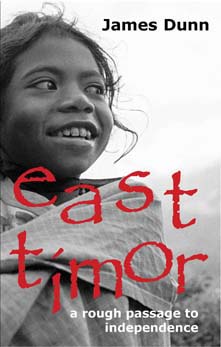 B43East Timor: A Rough Passage to Independence
B43East Timor: A Rough Passage to Independence
by James Dunn
From the days of the colonial Portuguese rule, through the tumultuous years of the Indonesian invasion, to the present day, this book is a disturbing portrayal of the complete failure of the international community to deal with the East Timor situation. With expert analysis and clarity of writing, James Dunn highlights the disturbing gap between the noble rhetoric and the heartless reality of our international commitment and resolve. More than the story of one tiny nation, East Timor reveals a great deal about 21st century world order and its weakness in relation to minorities and small states.
"I can hardly think of anyone other than James Dunn in a position to undertake a 'long duration' analysis of our recent history." Xanana Gusm�o, President, East Timor
For more than 30 years Dunn has worked in international relations, first as a defense analyst specializing in Indonesia, then as an Australian diplomat serving as consul in, then, Portuguese Timor. He has been a foreign affairs columnist, first with The Bulletin, and more recently as a regular columnist with the Fairfax newspapers. In 1999 he was awarded the ACFOA human rights award. In 2002 he was conferred the honor of Grande Official of the Order of Prince Henry by Dr Jorge Sampaio, the President of Portugal.
Review by Anthony L. Smith,Senior Research Fellow, Asia-Pacific Center for Security Studies, Hawai�i
Review in Canberra Times
Longueville Press (Australia). 2003. 424 pp. $40
B45 Remembering forgetting
by Ciaron O�Reilly
 A remarkable journey of nonviolent resistance, inspired by the struggle of the East Timorese, Ciaron tells the tale of a life dedicated to nonviolent resistance. Ciaron�s ideas are an inspiring challenge to conventional response to injustice. This is a tale of a journey of Australians and Britons awakened by the heroism of the East Timorese people, a people who refused to accept an Indonesian military invasion of their country that was facilitated by the international community.
A remarkable journey of nonviolent resistance, inspired by the struggle of the East Timorese, Ciaron tells the tale of a life dedicated to nonviolent resistance. Ciaron�s ideas are an inspiring challenge to conventional response to injustice. This is a tale of a journey of Australians and Britons awakened by the heroism of the East Timorese people, a people who refused to accept an Indonesian military invasion of their country that was facilitated by the international community.
Ciaron O�Reilly takes us on a nonviolent journey from the boardrooms of Brisbane mining companies to the high tech hangers of British Aerospace, Lancashire. He takes us from coffee with Australian counter terrorist operatives, through the pulpits of the Catholic Church, to attempted infiltration by the British Special Branch. British Aerospace take Ciaron and his colleagues to the High Court while the police arrest them.
Otford. 104 pp., paperback. $20
B7 The Timid and the Brave
by Liz Howells
 What do you believe in? Yourself? Your causes? Your friends? How can you effectively contribute when you are faced with unimaginable tragedy and fear? Liz Howell's writes about living with ordinary people faced with extraordinary challenges, far beyond those we in Australia accept as the norm.
What do you believe in? Yourself? Your causes? Your friends? How can you effectively contribute when you are faced with unimaginable tragedy and fear? Liz Howell's writes about living with ordinary people faced with extraordinary challenges, far beyond those we in Australia accept as the norm.
This is a moving testament of one person's journey through a country in turmoil (East Timor) where the ordinary was the exception, and the impossible was the everyday.
Liz Howells retired from Veteran Affairs in 1997 after 13 years.
Otford. Australia, 2001, 125 pp., paperback. $20
 B90 Xanana: Leader of the Struggle for Independent Timor-Leste
B90 Xanana: Leader of the Struggle for Independent Timor-Leste
B y Sarah Niner The charismatic Xanana Gusm�o shouldered the herculean task of leading his East Timorese people to independence. During the brutal 24-year war with Indonesia, he was transformed through crisis from being a young apolitical outsider into a hardened guerrilla commander and keen political strategist, who ultimately became the central unifying figure of East Timorese nationalism. This book focuses on his years in leadership and seeks to explain how the events of the time affected the development of his ideas, policies and strategies.
Australian Scholarly Publishing 2010. 296 pp. $40 paperback
see also Timor Lives! Speeches of Freedom and Independence by Xanana Gusm�o
B59 Timor Lives! Speeches of Freedom and Independence
by Xanana Gusm�o
 Timor Lives! takes us on the journey of the Democratic Republic of Timor-Leste to nationhood, as articulated by its charismatic "poet warrior" leader, President Kay Rala Xanana Gusm�o. Included are the President's Independence Day and Flag Raising ceremony speeches and his inaugural speech to the United Nations General Assembly. The speeches examine the creation of the Constitution and Gusm�o's personal quest for reconciliation, peace, and justice in his country.
Timor Lives! takes us on the journey of the Democratic Republic of Timor-Leste to nationhood, as articulated by its charismatic "poet warrior" leader, President Kay Rala Xanana Gusm�o. Included are the President's Independence Day and Flag Raising ceremony speeches and his inaugural speech to the United Nations General Assembly. The speeches examine the creation of the Constitution and Gusm�o's personal quest for reconciliation, peace, and justice in his country.
At the withdrawal of Portugal from its colonies in 1974, East Timor was invaded by Indonesia . Gusm�o became the revolutionary leader of his people; from the mountains of East Timor to a Jakarta prison cell he continued to run the resistance against the invading forces. On 14 April 2002, Gusm�o won a landslide victory to become President of the Democratic Republic of Timor-Leste.
2005. 250 pp. Longueville Press.
$40
Book Launch Speech by Honourable Justice Marcus Einfeld
see alsoXanana: Leader of the Struggle for Independent Timor-Leste by Sarah Niner
 B4Funu: The Unfinished Saga of East Timor
B4Funu: The Unfinished Saga of East Timor
by Jos� Ramos-Horta
A personal story by the1996Nobel Peace Prizewinnerand current President of Timor-Leste on the shocking genocide of the Timorese people at the hands of the Indonesian occupants. Autobiography and observations of the U.N. and the struggle for independence.
"The pathos of East Timor lies in the fact that in an age of instant communications, in which the victims' grief is seen and heard around the world, argued over by statesmen and kept alive in the public mind which allows hope for redress its suffering is muted by indifference, remoteness, and underdevelopment.... Mr. Ramos-Horta's book presents a modest, more-in-sorrow-than-anger account of his bitter experience of the world's indifference to Indonesia's aggression."--The New York Times Book Review_, upon the original publication of 'Funu'_
208 pp. Red Sea Press, US, 1987. $15
B34 Self-Determination in East Timor: The United Nations, the Ballot, and International Intervention
by Ian Martin
 Self Determination in East Timor is an account of the 1999 popular consultation in East Timor, from the negotiations that led to the May 5 Agreements between Indonesia, Portugal, and the United Nations, to the mandating of international intervention to check the violence which followed the peaceful ballot. It describes how political change in Indonesia, the UN's active good offices role, and pressures from Australia and elsewhere led President Habibie to offer the East Timorese a choice between autonomy within Indonesia and independence. Written from the standpoint of the Secretary-General's Special Representative in East Timor, it provides a unique inside account of how UNAMET, the mission established to implement the ballot, went about its task.
Self Determination in East Timor is an account of the 1999 popular consultation in East Timor, from the negotiations that led to the May 5 Agreements between Indonesia, Portugal, and the United Nations, to the mandating of international intervention to check the violence which followed the peaceful ballot. It describes how political change in Indonesia, the UN's active good offices role, and pressures from Australia and elsewhere led President Habibie to offer the East Timorese a choice between autonomy within Indonesia and independence. Written from the standpoint of the Secretary-General's Special Representative in East Timor, it provides a unique inside account of how UNAMET, the mission established to implement the ballot, went about its task.
"Martin manages to address [the issues] in both a stimulating and highly readable fashion so that expert and novice, policy-maker and academic, can glean a range of facts and insights." � Hugo Dobson, International Peacekeeping
"Martin's insightful account of East Timor's first democratic election offers an invaluable perspective on the UN's involvement in the territory's tortuous democracy-building process." � Terence Duffy, New World
Published by Lynne Rienner Publishers, 2001, 171 pp. Paperback
$25
An International Peace Academy Occasional Paper
 B46The East Timor Problem and the Role of Europe
B46The East Timor Problem and the Role of Europe
Edited by Pedro Pinto Leite.
Papers by Noam Chomsky, James Dunn, Roger Clark, Mairead Maguire, Jos� Ramos-Horta, Mario Soares and others presented at a 1996 conference.
304 pp. International Platform of Jurists for East Timor, Netherlands/Portugal. Hardcover only. 1998.
$10
 B2East Timor: Genocide in Paradise
B2East Timor: Genocide in Paradise
By Matthew Jardine
Introduction by Noam Chomsky.
Basics everyone should know.
95 pp. Odonian/Common Courage Press, U.S., 1999. (2nd Edition) $8
B1 East Timor'sUnfinished Struggle: Inside the Timorese Resistance
By Constancio Pinto and Matthew Jardine
Preface by Jose Ramos Horta. Foreword by Allan Nairn.
 A riveting first-hand account of the East Timorese struggle. Called "a land of crosses", East Timor is dominated by the gravestones of more than 200,000 people who have died as a result of the U.S.-supported Indonesian invasion and annexation of the former Portuguese colony. In East Timor�s Unfinished Struggle, Const�ncio Pinto, a leader in the resistance movement and colleague of the two Nobel Peace Prize winners, and Matthew Jardine, an experienced chronicler of the situation in East Timor, offer a first-hand account of life inside the Timorese independence movement.
A riveting first-hand account of the East Timorese struggle. Called "a land of crosses", East Timor is dominated by the gravestones of more than 200,000 people who have died as a result of the U.S.-supported Indonesian invasion and annexation of the former Portuguese colony. In East Timor�s Unfinished Struggle, Const�ncio Pinto, a leader in the resistance movement and colleague of the two Nobel Peace Prize winners, and Matthew Jardine, an experienced chronicler of the situation in East Timor, offer a first-hand account of life inside the Timorese independence movement.
In this emotional and inspiring memoir, Pinto describes Portuguese colonialism, East Timor�s brief moment of independence in 1975, the U.S.-backed invasion, life under more than 20 years of Indonesian occupation, and the formation of a courageous movement for Timorese self-determination.
In addition to providing a helpful primer on Timorese culture, politics, and society, an introduction and epilogue by Jardine discuss the international solidarity movement that has stepped up the fight to win self-determination for East Timor.
"A must read. This simply amazing story will make you want to get up and fight for the rights of the people of East Timor....It will reaffirm your faith in the human spirit."
-- Global Education News
"This is not only a must for supporters of the East Timor solidarity movement but also for a wider public. Constancio Pinto's story shows why it is that the East Timorese deserve the solidarity of anybody who cherishes peace and justice." -- TAPOL Bulletin
292 pp. South End Press, US, 1996.
$16
B60 The UN in East Timor: Building Timor Leste, A Fragile State
by Juan Federer
 This unique book provides an insider's account of the East Timor liberation struggle. It is also an academically rigorous study of the creation by the United Nations of Timor Leste, the world's newest independent state. Dr Juan Federer, for many years closely involved in the struggle for the liberation of the territory, examines the UN state-building work in East Timor. He concludes that it was insufficient to lay the foundations for a well-functioning state. Timor Leste is a very fragile state, whose future is uncertain. Once again, the UN was hamstrung by the limited commitment shown by its member states.
This unique book provides an insider's account of the East Timor liberation struggle. It is also an academically rigorous study of the creation by the United Nations of Timor Leste, the world's newest independent state. Dr Juan Federer, for many years closely involved in the struggle for the liberation of the territory, examines the UN state-building work in East Timor. He concludes that it was insufficient to lay the foundations for a well-functioning state. Timor Leste is a very fragile state, whose future is uncertain. Once again, the UN was hamstrung by the limited commitment shown by its member states.
The author argues for a stronger international state-building effort to strengthen fragile or failing post-colonial states. East Timor/Timor Leste would have provided a perfect opportunity to do such work properly. He stresses the need for the international community to seriously address the international humanitarian and security problem presented by fragile states -- a long-term legacy of the 20th century colonial experience. The book's publication on the eve of the creation of the UN Peace Building Commission is well timed.
Chilean-born Federer was a key advisor and colleague of Jos� Ramos-Horta and the East Timorese resistance. He was a founder of Timor Aid and the East Timor International Solidarity Centre.
2005. 134 pp., Charles Darwin University Press
. $40
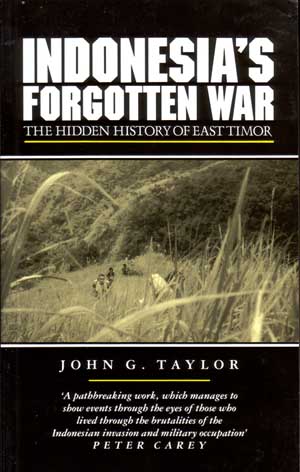 B17 Indonesia's Forgotten War: The Hidden History of East Timor (Politics in Contemporary Asia)
by John G. Taylor
B17 Indonesia's Forgotten War: The Hidden History of East Timor (Politics in Contemporary Asia)
by John G. Taylor
A path breaking work, which manages to show events through the eyes of those who lived through the brutalities of the Indonesian invasion and military occupation. Peter Carey
The great strength of this comprehensively researched book is its skillful combination of easily accessible academic analysis and eyewitness accounts, from which emerge the voices of the East Timorese themselves. The result is a work of immense power and immediate impact. Journal of Contemporary Asia
240 pp Zed Books 1991
. $20
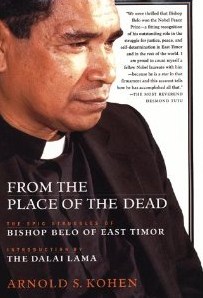 B23From the Place of the Dead: The Epic Struggles of Bishop Belo of East Timor
B23From the Place of the Dead: The Epic Struggles of Bishop Belo of East Timor
by Arnold S. Kohen
Biography of the 1996 Nobel Prize winner.
Leader for peace in a tortured country, Bishop Belo of East Timor became the first Catholic bishop to receive the Nobel Peace Prize in 1996. Foremost among leaders of his homeland, he has worked to end the suffering of his people. This sympathetic biography portrays the bishop and his country in the years before and during the Indonesian occupation, which has brought death and despair to so many. It reveals American support for Indonesia during this period and examines the Vatican's complicated role.-Library Weekly
331 pp, hardcover. St. Martin�s Press, U.S., 1999. $28
BY AND ABOUT NOAM CHOMSKY
B35 Rogue States The Rule of Force in World Affairs
by Noam Chomsky
 In_Rogue States_, Noam Chomsky holds the world�s superpowers to their own standards of the rule of law�and finds them appallingly lacking. Described in a 1998 profile in the New York Times as "an exploder of received truths," Noam Chomsky is the world�s most informed, controversial, and articulate opponent of political hypocrisy and abuse of power.
In_Rogue States_, Noam Chomsky holds the world�s superpowers to their own standards of the rule of law�and finds them appallingly lacking. Described in a 1998 profile in the New York Times as "an exploder of received truths," Noam Chomsky is the world�s most informed, controversial, and articulate opponent of political hypocrisy and abuse of power.
Rogue States is the latest result of his tireless efforts to measure the world�s superpowers by their own professed standards and to hold them responsible for the indefensible actions they commit in the name of democracy and human rights, including East Timor. The United States and its allies come in for particular scrutiny for their numerous recent violations of the very international laws they claim to uphold, making them the real "rogue states" in the world today.
Characteristically incisive, provocative, and rousing, Chomsky leaves no bombshell unexploded in his evaluation of the West�s shameless reliance on the rule of force today.
South End Press, 2000, 264 pp. 2000. Paperback
$16
 B15Manufacturing Consent: Noam Chomsky and the Media
B15Manufacturing Consent: Noam Chomsky and the Media
Companion to the documentary film. Funny, provocative and surprisingly accessible,Manufacturing Consent explores the political life and ideas of Noam Chomsky, world-renowned linguist, intellectual and political activist. Features an annotated copy of the script with excerpts from relevant material with comments from Chomsky interspersed throughout. Large format book includes a substantial section on East Timor along with expanded and updated notes and resource list. Edited by filmmaker.
250 pp. Black Rose Books, Montreal, 1994. $22
 B49 East Timor Testimony
B49 East Timor Testimony
Photographs by Elaine Briere 64 duotone photographs and original essays by nine authors, including Noam Chomsky, Charles Scheiner, Constancio Pinto, James Dunn, Ines Martins and Carmel Budiardjo.
188pp. Between the Lines, Toronto, 2004 $35
"What is striking about her portraits is the eyes of her subjects....we don't just stare at Bri�re's people: They also stare back at us. Because she captured the human essence of East Timor, Bri�re's photographs turned out to be enormously effective as political art. After seeing her pictures, it was hard to dismiss East Timor as a faraway place of little consequence."
-- Jeet Heer, National Post, June 17, 2004
see also V1 -
[Bitter Paradise: The Sell-out of East T](audivid.htm#Bitter Paradise)[imor](audivid.htm#Bitter Paradise)
B6Generations of Resistance: East Timor Photographs by Steve Cox, with introduction by Peter Carey
 Extraordinary photos of East Timor, including 8 in color of the Santa Cruz massacre.
Extraordinary photos of East Timor, including 8 in color of the Santa Cruz massacre.
Images of contemporary life in East Timor, illustrate the reality of existence under Indonesian occupation and the horror of events such as the 1991 Santa Cruz massacre. Having lived among and gained the trust of the Timorese, Cox's photographs unmasked the deceptions of Indonesian government propaganda and provided substance to foreign journalists whose reports were heavily circumscribed by official restrictions. These insights into the daily struggle with suffering and death in East Timor are accompanied by an authoritative historical introduction of events since 1975 by Peter Carey.
Cassell, UK, 1995. Large format, 120 pp. $39.50
 B8 - Telling: East Timor Personal Testimonies 1942-1992
By Michelle Turner.
B8 - Telling: East Timor Personal Testimonies 1942-1992
By Michelle Turner.
Oral accounts by East Timorese, recounting what they have lived through from the Japanese occupation to human rights abuses under Indodnesia military..
NSW Press, Australia, 1992.
218 pp. $35
B26 Inside Out East Timor
By Ross Bird
 A personal photographic account of East Timor and its people. Visiting East Timor three times since 1995, Australian photographer Ross Bird juxtaposes color photographs of life in this country with black and white portraits of those Timorese who have fled their homeland since Indonesia invaded in 1975.
A personal photographic account of East Timor and its people. Visiting East Timor three times since 1995, Australian photographer Ross Bird juxtaposes color photographs of life in this country with black and white portraits of those Timorese who have fled their homeland since Indonesia invaded in 1975.
Herman Press, Australia. July 1999. 168 pp, 130 photos. $40 paper
 B3 East Timor and the United Nations: The Case for Intervention
B3 East Timor and the United Nations: The Case for Intervention
By Geoffrey C. Gunn In addition to the author�s own analysis of the situation, this book features a selection of relevant UN documents and other primary sources relating to East Timor, including the key General Assembly and Security Council resolutions of 1975-1982, the damning reports of the UN Special Rapporteurs; the hyper proceduralist utterances of the foreign ministers meetings; and the World Court "no-case" judgment on the Australian deal with Indonesia over East Timor�s oil reserves.
Africa World Press, US, 1997. 240 pp. $20
See also [Complicity in Genocide: Report to the East Timor "Truth Commission" on International Actors](#B63 gunn0)
 |
B110 East Timor: A Western Made TragedyBy Mark Aarons and Robert Domm, forward by Jose Ramo-Horta This examination of Indonesia's occupation of East Timor since 1975 pays particular attention to the role played by Australia and the U.S... Aarons travelled widely in East Timor as journalists for the ABC in 1975; Robert Domm visited in 1989 and 1990. He was the first outsider to interview guerilla leader Xanana Gusmao. The appendices look at the legality of the Timor Gap Treaty and excerpt a report by Amnesty International on human rights. The Left Book Club, 1992, 96 pp.$20 paperback. |
|---|
|  B111 Papua Land of Peace: Addressing Conflict Building Peace in West PapuaEdited by Budi Hernawan This book documents efforts to build Papua as a Land of Peace after decades of conflict and social tension within the region. Articles describe how difficult achieving peace can be, while documenting why it must be done. The book has a special focus on the efforts of religious leaders and institutions. Office for Justice and Peace, Catholic Diocese of Jayapura, 2005, 107 pp. Paperback.$15 | |
| ---------------------------------------------------------------------------------------------------------------------------------------------------------------------------------------------------------------------------------------------------------------------------------------------------------------------------------------------------------------------------------------------------------------------------------------------------------------------------------------------------------------------------------------------------------------------------------------- | |
B111 Papua Land of Peace: Addressing Conflict Building Peace in West PapuaEdited by Budi Hernawan This book documents efforts to build Papua as a Land of Peace after decades of conflict and social tension within the region. Articles describe how difficult achieving peace can be, while documenting why it must be done. The book has a special focus on the efforts of religious leaders and institutions. Office for Justice and Peace, Catholic Diocese of Jayapura, 2005, 107 pp. Paperback.$15 | |
| ---------------------------------------------------------------------------------------------------------------------------------------------------------------------------------------------------------------------------------------------------------------------------------------------------------------------------------------------------------------------------------------------------------------------------------------------------------------------------------------------------------------------------------------------------------------------------------------- | |
 B112 East Timor - Nationbuilding in the 21st Century
B112 East Timor - Nationbuilding in the 21st Century
Edited by Gabriel Jonsson
A report on the �East Timor- Nationbuilding in the 21st Century� seminar arranged by the East Timor Committee in cooperation with the Center for Pacific Asia Studies at Stockholm University. The seminar sought to illuminate the creation of East Timor as the first new nation of the 21stcentury.
Center for Pacific Asia Studies � Stockholm University, East Timor Committee, 2002, 86 pp. Paperback $20
 B113 Timor Lorosa�e: One Momentous Year
B113 Timor Lorosa�e: One Momentous Year
Photographs and stories by a collection of various authors
With little access to news and information in the immediate aftermath of the 1999 destruction, most Timorese had never seen the photographs or read others� stories about the landmark events of 1999-2000. The UN published bi-lingual (English, Tetun) this impressionistic history containing photographs and anecdotes.
United Nations Transitional Administration in East Timor, Sept 2000, 112 pp. $20 full-color paperback.
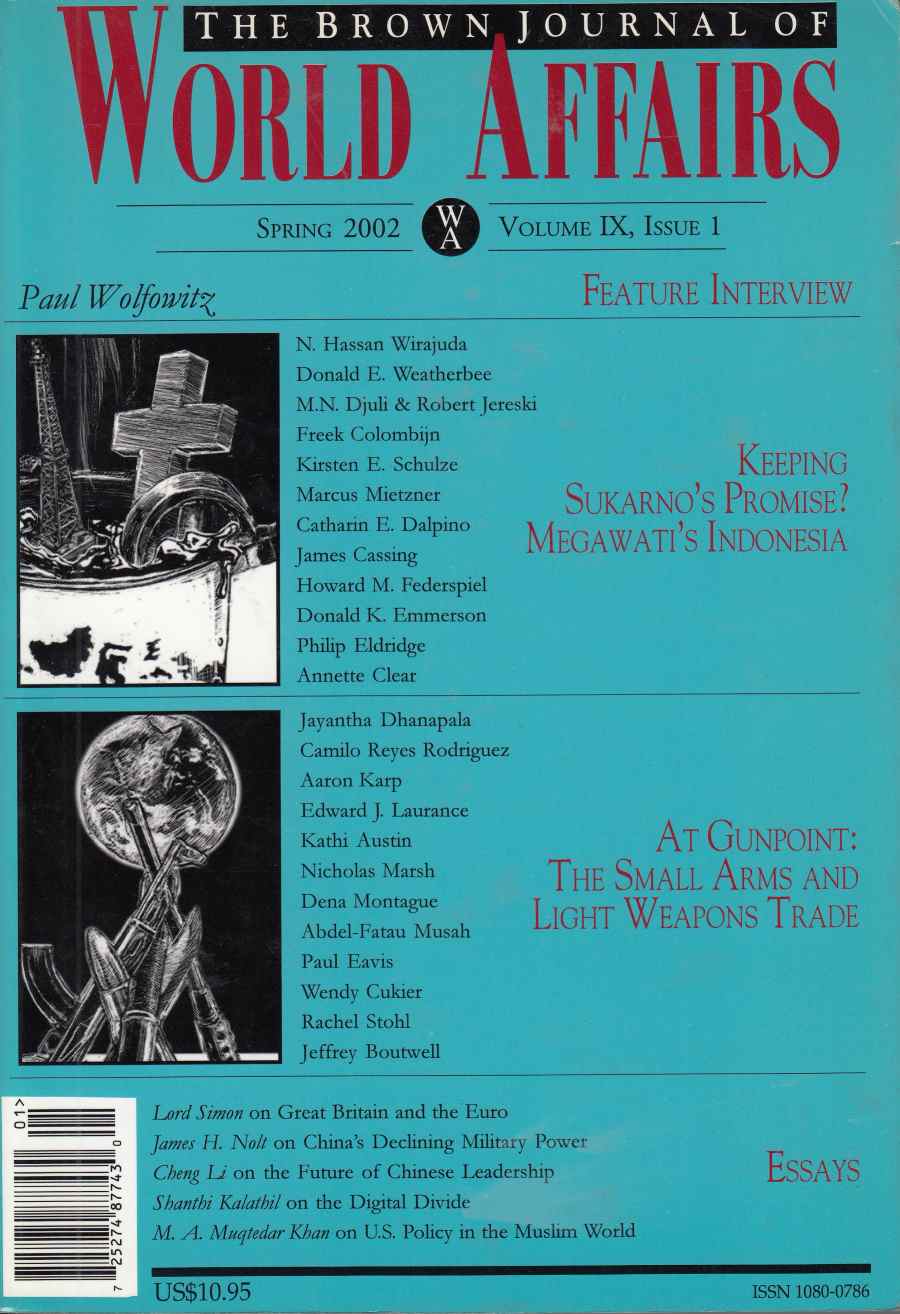 B114 Brown Journal of World Affairs: Keeping Sukarno�s Promise? Megawati�s Indonesia
B114 Brown Journal of World Affairs: Keeping Sukarno�s Promise? Megawati�s Indonesia
This issue contains a collection of essays, speeches and articles by a range of academics analyzing the social, political and economic state of the then-newly-democratic Indonesia. Articles address the challenges Indonesia faced as it comes out Suharto�s shadow. The journal also features an interview with Paul Wolfowitz, former U.S. ambassador to Indonesia and former Deputy Secretary of Defense and a section on the international trade in small arms.
The Brown Journal of World Affairs, 2002, 362 pp. $25 paperback.
 B115 Mapping the Pursuit of Gender Equality: Non-Government and International Agency Activity in Timor-Leste
B115 Mapping the Pursuit of Gender Equality: Non-Government and International Agency Activity in Timor-Leste
By Anna Trembath and Damian Grenfello
Gender is an important and frequently cited area of discourse and activity in contemporary Timor-Leste. Many organizations work to challenge the disparities that women experience in terms of access to rights, wellbeing, services and power. Gender is also regularly connected with major themes of nation-building and development. Activists and advocates have drawn attention to the history of women�s activism and organizing in Timor-Leste under the conditions of colonialism and war, and have endeavoured to articulate a unique role for women in shaping the national history of Timor-Leste. In doing so, there is an attempt to recognize women�s contributions to guerrilla and clandestine fronts, at least in part so as to create opportunities for women to influence contemporary nationbuilding processes. Hence, the history of East Timor is re-framed to advance the status of women within the new nation. The report provides gender profiles of key civil society groups, NGOs and inter-governmental organizations in Timor-Leste; includes and extensive bibliography on the subject.
The Globalism Institute- RMIT University, 2007, 101 pp. Paperback. $15
President Suharto's fall from power in 1998 ushered in a period of political reform (reformasi). But democratization has been met with resistance, and after September 11, 2001, rising military influence in Indonesia was reinforced by an international environment that emphasizes security concerns at the expense of rights and freedoms. These convergent forces contributed to renewed conflict in the province of Aceh, antiterrorism legislation that reversed hard-won safeguards, and continued attacks on human rights defenders.
Human Rights First, 2005, 28 pp. Paperback. $10
 B14 East Timor: Prospects for Peace
B14 East Timor: Prospects for Peace
Report and Papers of an Ecumenical Consultation. Includes key background documents.
World Council of Churches,142 pp. Geneva, 1995. $7
 B12Power and Impunity: Human Rights Under the New Order
B12Power and Impunity: Human Rights Under the New Order
In-depth report by Amnesty International on Indonesia and East Timor.
Amnesty International, 126 pp. UK, 1994. $8
B18 Indonesia: Arms Trade to a Military Regime European Network Against Arms Trade
 Overview of Indonesia's military plus detailed chapters on their weapons suppliers,
Overview of Indonesia's military plus detailed chapters on their weapons suppliers,
including Australia, the US, Canada,the EU,and 10 European countries.
124 pp. European Network Against Arms Trade, Amsterdam, 1997. $8
 B7 The East Timor Question: The Struggle for Independence from Indonesia
Edited by Paul Hainsworth and Stephen McCloskey
B7 The East Timor Question: The Struggle for Independence from Indonesia
Edited by Paul Hainsworth and Stephen McCloskey
Chronicles the global support and solidarity movement (including ETAN) that accompanied East Timor to nationhood, as well as the policy changes it achieved in key countries. Includes a preface by Jose Ramos-Horta, introduction by Australian/British filmmaker John Pilger,withchapters by Charles Scheiner (ETAN), Carmel Budiardjo (TAPOL), and others from East Timor, the U.K., Ireland, Australia and elsewhere.
- Introduction: East Timor From European to Third World Colonialism Stephen McCloskey
- Reporting East Timor: Western Media Coverage of the Conflict Hugh O'Shaughnessy
- Balibo: The Cover-up that Led to Genocide Maureen Tolfree
- The Legacy of the Suharto Dictatorship Carmel Budiardjo
- The Indonesian Propaganda War against East Timor Estevao Cabral
- Seeds of Hope East Timor Ploughshares Disarming the Hawks Andrea Needham, Jen Parker and Jo Wilson
- The United States: From Complicity to Ambiguity Charles Scheiner
and more
222 pp. I.B.Tauris, London. 2000. $25
 B13 - International Law and the Question of East Timor
B13 - International Law and the Question of East Timor
Revised papers presented at a CIIR/International Platform of Jurists for East Timor Conference "Indonesia's occupation of East Timor:Legal Questions" held in London in December 1992. Preface by James Dunn, Contributions from George Aditjondro, Roger C. Clark, John G. Taylor, Gerry Simpson, Paula Escarameia and more.
352 pp. CIIR/IPJET UK 1995. $40
see also The East Timor Problem and the Role of Europe
 B102 Genocide and Resistance in Southeast Asia
Documentation, Denial and Justice in Cambodia and East Timor
by Ben Kiernan
B102 Genocide and Resistance in Southeast Asia
Documentation, Denial and Justice in Cambodia and East Timor
by Ben Kiernan
Two modern cases of genocide and extermination began in Southeast Asia in the same year. Pol Pot's Khmer Rouge regime ruled Cambodia from 1975 to 1979, and Indonesian forces occupied East Timor from 1975 to 1999. This book examines the horrific consequences of Cambodian communist revolution and Indonesian anti-communist counterinsurgency. It also chronicles the two cases of indigenous resistance to genocide and extermination, the international cover-ups that obstructed documentation of these crimes, and efforts to hold the perpetrators legally accountable.
The perpetrator regimes inflicted casualties in similar proportions. Each caused the deaths of about one-fifth of the population of the nation. Cambodia's mortality was approximately 1.7 million, and approximately 170,000 perished in East Timor. In both cases, most of the deaths occurred in the five-year period from 1975 to1980. In addition, Cambodia and East Timor not only shared the experience of genocide but also of civil war, international intervention, and UN conflict resolution. U.S. policymakers supported the invading Indonesians in Timor, as well as the indigenous Khmer Rouge in Cambodia. Both regimes exterminated ethnic minorities, including local Chinese, as well as political dissidents. Yet the ideological fuel that ignited each conflagration was quite different. Jakarta pursued anti-communism; the Khmer Rouge were communists. In East Timor the major Indonesian goal was conquest. In Cambodia, the Khmer Rouge's goal was revolution. Maoist ideology influenced Pol Pot's regime, but it also influenced the East Timorese resistance to the Indonesia's occupiers.
Genocide and Resistance in Southeast Asia is significant both for its historical documentation and for its contribution to the study of the politics and mechanisms of genocide. It is a fundamental contribution that will be read by historians, human rights activists, and genocide studies specialists.
363 pp. Transaction, 2007 $30
B33 - Bitter Flowers, Sweet Flowers: East Timor, Indonesia,
 and the World Community
Edited by Richard Tanter , Mark Selden , and Stephen R. Shalom Three activist academics have put together this book which comprehensively describes the process and prospects for East Timor's independence. Bitter Flowers, Sweet Flowers includes chapters by analysts and first-hand participants in East Timor's 1999 referendum, incorporating both the facts and the emotion of that difficult process. By incorporating U.N., academic, resistance, solidarity, and East Timorese perspectives, this book covers the background and history of the referendum, the context and process of how which it occurred, and possibilities for East Timor�s future. Authors include many familiar to ETAN: Allan Nairn, Constancio Pinto, Charles Scheiner, Noam Chomsky, Sarah Niner, Arnold Kohen and others. "The overall effect of Bitter Fowers, Sweet Flowers is worthwhile and thought-provoking. This volume is to be highly recommended as a reader on East Timor."-Southeast Asian Studies"Bitter Flowers is an invaluable resource for the lessons of East Timor, the youngest nation in the third millennium and a source of hope to all who value liberty."**- Kerry Kennedy Cuomo, author of Speak to Power**Part I, "East Timor: Resistance, Repression, and the Road to Independence," explore the dynamics of the long struggle for independence, from Portugal and then Indonesia, focusing particularly on the role of the National Council of Timorese Resistance and the Catholic Church. Part II, "Referendum and Independence," provides four eyewitness accounts of the 1999 UN-sponsored referendum and the concomitant militia violence supported by the Indonesian military. Part III, "East Timor, the United States, and the World Community," examines international dimensions of the struggle. Part IV, "East Timor and Indonesia," looks at the changing character of the Indonesian state and the significance of East Timor in Indonesian political developments. The final section, "The Future of East Timor," considers the prospects for an independent East Timor, charting the potential shoals that lie ahead. Rowman & Littlefield, 2001. 304 pages. Paperback. $45
and the World Community
Edited by Richard Tanter , Mark Selden , and Stephen R. Shalom Three activist academics have put together this book which comprehensively describes the process and prospects for East Timor's independence. Bitter Flowers, Sweet Flowers includes chapters by analysts and first-hand participants in East Timor's 1999 referendum, incorporating both the facts and the emotion of that difficult process. By incorporating U.N., academic, resistance, solidarity, and East Timorese perspectives, this book covers the background and history of the referendum, the context and process of how which it occurred, and possibilities for East Timor�s future. Authors include many familiar to ETAN: Allan Nairn, Constancio Pinto, Charles Scheiner, Noam Chomsky, Sarah Niner, Arnold Kohen and others. "The overall effect of Bitter Fowers, Sweet Flowers is worthwhile and thought-provoking. This volume is to be highly recommended as a reader on East Timor."-Southeast Asian Studies"Bitter Flowers is an invaluable resource for the lessons of East Timor, the youngest nation in the third millennium and a source of hope to all who value liberty."**- Kerry Kennedy Cuomo, author of Speak to Power**Part I, "East Timor: Resistance, Repression, and the Road to Independence," explore the dynamics of the long struggle for independence, from Portugal and then Indonesia, focusing particularly on the role of the National Council of Timorese Resistance and the Catholic Church. Part II, "Referendum and Independence," provides four eyewitness accounts of the 1999 UN-sponsored referendum and the concomitant militia violence supported by the Indonesian military. Part III, "East Timor, the United States, and the World Community," examines international dimensions of the struggle. Part IV, "East Timor and Indonesia," looks at the changing character of the Indonesian state and the significance of East Timor in Indonesian political developments. The final section, "The Future of East Timor," considers the prospects for an independent East Timor, charting the potential shoals that lie ahead. Rowman & Littlefield, 2001. 304 pages. Paperback. $45

editied by Kira Brunner (Author), Nicolaus Mills
This award-winning group of reporters and scholars, including, among others, David Rieff, Peter Maass, Philip Gourevitch, William Shawcross, George Packer, Bill Berkeley and Samantha Power revisit four of the worst instances of state-sponsored killing--Cambodia, Yugoslavia, Rwanda, and East Timor--in the last half of the twentieth century in order to reconsider the success and failure of U.S. and U.N. military and humanitarian intervention.Featuring original essays and reporting, With chapters on East Timor by Geoffrey Robinson, Richard Lloyd Parry and Erin Towbridge.
Basic Books, 2002, 276 pp.
$20 hardcover
 B5- East Timor at the Crossroads: The Forging of a Nation
Edited by Peter Carey and G. Carter Bentley.
B5- East Timor at the Crossroads: The Forging of a Nation
Edited by Peter Carey and G. Carter Bentley.
All aspects of East Timor, with contributions from Roger S. Clark, Shirley Shackleton, Ben Anderson, Pat Walsh and more, with unsurpassed bibliography.
Cassell/U. Hawaii, US, 1995. 259 pp. $20
---
 B32 East Timor, Indonesia, and the World Community: Resistance, Repression, and Responsibility
Special Issue, Bulletin of Concerned Asian Scholars
Richard Tanter, Mark Selden, and Stephen R. Shalom, editors
B32 East Timor, Indonesia, and the World Community: Resistance, Repression, and Responsibility
Special Issue, Bulletin of Concerned Asian Scholars
Richard Tanter, Mark Selden, and Stephen R. Shalom, editors
Articles written by an international group of scholars and activists. All of the contributions in this issue are imprinted with the crisis of the moment (as events unfolded in the fall of 1999), but the more than 20 articles and accompanying materials also bring to bear the expertise of authors with a longer view of the politics, economics, society, and military affairs of East Timor, Indonesia, and the wider arena of Southeast Asia and the world. Authors include: Allan Nairn, Richard Falk, Noam Chomsky, Sylvia Tiwon, Scott Burchill, Coki Naipospos, Sarah Niner and more.
Includes maps, chronology, and poetry.
Bulletin of Concerned Asian Scholars, US 2000 143 pp. $20
---
B39 Bitter Dawn: East Timor A People's Story by Irena Cristalis
 Few nations have endured a birth as traumatic and painful as the world's youngest country, East Timor. Born amid the flames, pillage and mayhem that surrounded Indonesia's reluctant withdrawal in 1999, it will for years be coping with the effects of destruction. Irena Cristalis, one of a handful of foreign journalists who stayed on during that nightmare to report it to the world, has kept faith with the Timorese friends whose story she decided to tell. Her book is a vivid first-hand account of the lives of individual Timorese during the long decades of Indonesia's repressive occupation, their often heroic struggle for freedom, and their efforts to cope with the dramatic historic shifts engulfing them. Based on years of research and lengthy interviews with East Timor's past, present and future leaders, it explores the complexities of East Timor's internal politics. The book also tells the story of the ordinary students, farmers, nuns, priests, journalists and others, who found themselves playing extraordinary roles in terrible times.
Few nations have endured a birth as traumatic and painful as the world's youngest country, East Timor. Born amid the flames, pillage and mayhem that surrounded Indonesia's reluctant withdrawal in 1999, it will for years be coping with the effects of destruction. Irena Cristalis, one of a handful of foreign journalists who stayed on during that nightmare to report it to the world, has kept faith with the Timorese friends whose story she decided to tell. Her book is a vivid first-hand account of the lives of individual Timorese during the long decades of Indonesia's repressive occupation, their often heroic struggle for freedom, and their efforts to cope with the dramatic historic shifts engulfing them. Based on years of research and lengthy interviews with East Timor's past, present and future leaders, it explores the complexities of East Timor's internal politics. The book also tells the story of the ordinary students, farmers, nuns, priests, journalists and others, who found themselves playing extraordinary roles in terrible times.
Zed Press. 2002. 306 pp. $25 paperback
East Timor: A Nation's Bitter Dawnupdated edition of Bitter Dawn: A People's Story




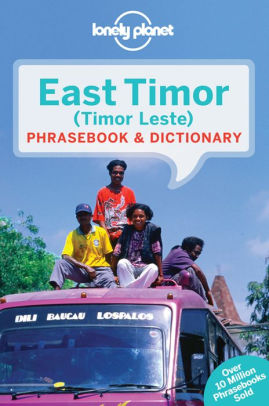
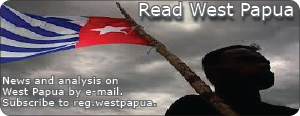
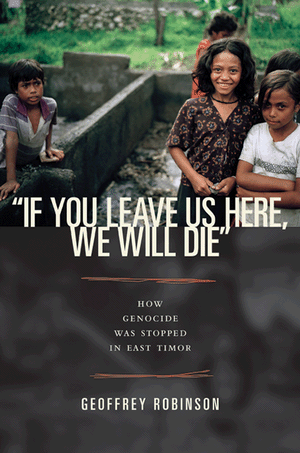 ](#B96 Robinson)
](#B96 Robinson) ](#Reluctant Saviour)
](#Reluctant Saviour)